- Home
- Ann M. Martin
With You and Without You Page 4
With You and Without You Read online
Page 4
I turned but saw Denise talking to him. She must have told him what I’d said. He didn’t call me again.
I reached the porch steps. Mouse was sitting contentedly on the top one, in the same spot where Charlie had been not long ago. Suddenly I hated her. I wanted to hurt her for being alive when Charlie was dead. So I did something terrible. I purposely stepped on her tail—hard—as I went past her.
Mouse shrieked with pain and surprise. She tore off the porch and into the bushes to nurse her tail. I ignored her and went to my room.
An hour later there was a knock on my door.
“What?” I said.
I’d been sitting on my bed all that time. Not crying, just sitting and staring and thinking. Once I’d gotten up to look out the window. I could see the bloodstain in the street.
Mom and Dad came in, followed by Denise.
“Honey,” said Mom, “a doctor at the Center looked at Charlie right away, but he said there was nothing to be done. Charlie must have been killed instantly.”
“I know,” I said.
“They cleaned him up, though,” said Dad, “and Mom and Brent brought him home. We thought it would be nice to bury him out back next to Spanky.”
Spanky was the first cat we’d had. She’d died of old age when she was fourteen.
“Okay,” I said. “But not right now.”
“And,” added Mom, “the vet said if we ever want to get another cat, the Center often has litters of orphaned kittens. They’d be glad to give us one. They always need people to give strays good homes.”
“Mom,” I said stiffly, “Dad, Denise—I do not want another cat. Do you understand?” I couldn’t say anymore. I didn’t want to start crying yet. I took two deep breaths while everyone began talking at once.
“Baby,” began Dad.
“Honey,” said Mom.
“Liza,” Denise said.
But I cut them all off. “Would you please just get out of here? Please—leave—me—alone.”
And they did, but the door hadn’t been closed for more than a minute when Hope let herself in.
“I’m sorry about Charlie,” she said, crawling up beside me on the bed.
I sighed.
“Is he really dead?”
“Yes, Hopie. He’s really dead.”
“Mommy said that means we won’t see him anymore.”
“That’s right. After we bury him, we won’t see him anymore.”
“Why do we bury him?”
“Could you please go ask Mom, Tink?” I said. “I don’t want to talk about it.”
“Are you sad?” asked Hopie.
“Yes. I’m sad.”
“Well, don’t worry. I know a secret.”
“What?” I asked. I was losing my patience.
“He will be back,” whispered Hope, leaning toward me conspiratorially. “Not right away. But later. He’ll come back. Maybe in some days or some weeks.” She nodded her head wisely, as if confirming this information.
“Look, Sissy,” I said. “Will you do me a big favor? Will you go downstairs right now and talk about this with Mom and Dad? Tell them just what you told me.”
“Why?” asked Hopie.
“Because I said.”
“But it’s a secret.”
“They’ll keep the secret. Okay?”
“All right.”
Hopie left reluctantly.
Later that afternoon, we held a funeral for Charlie. Our whole family was there, plus Denise. The Pet Emergency Center had sent Charlie home in a plastic bag. We put the bag in a box.
Then Brent dug a hole in the ground under an ash tree next to an uneven piece of slate that said in faded white letters:
SPANKY
A Sweet Cat
We stood in a huddle in the warm sunshine and watched Brent place the box in the hole and start burying it with shovelfuls of dirt.
“Daddy,” whimpered Hopie. “If Brent covers him up, he won’t be able to get out.”
“He can’t get out, Emmy,” Dad said firmly. “He’s dead. That means he won’t come back. Do you understand?”
Hope didn’t answer. She just let her tears fall silently.
Brent finished burying Charlie.
Then I got the new piece of slate on which I’d carefully printed:
CHARLIE
That was all that was going on his gravemarker. I didn’t think anything else needed to be said. Carrie and Denise helped me push the marker into the frozen ground and prop it up with rocks.
Then I stood, brushing the dirt off my hands, and turned to my family. They were standing solemnly, facing the new grave. Suddenly nobody had anything to say. We just looked at each other. I knew we were all thinking the same thing. The next funeral would probably be Dad’s.
Dad turned abruptly and started walking toward the house, Fifi at his side. We let him go.
Everybody managed to find something to do outdoors. We knew Dad needed to be alone. Denise and I walked back to the edge of our property and sat down in two ancient tire swings that hung from the branches of a gigantic old maple.
“I can’t cry,” I said to Denise. “All this week I cried about Dad, and now Charlie’s really dead and I can’t cry.”
“I know,” said Denise.
“You do?” I asked.
“Mm-hmm. When my dad died I couldn’t cry at first either. I was too numb. Also, I was afraid to cry. It was like …” She paused, thinking. “It was like, the thing I had to cry over was so awful, I was afraid if I started, I’d never be able to stop. So I put it off for weeks. I kept telling myself I was strong and that only babies cried. I told myself I didn’t need to cry. Then when I did, when I couldn’t keep it inside any longer, it was pretty awful. That was the time when I wouldn’t speak to you. And I stayed out of school for a whole week, remember?”
I nodded.
“Mom said I should have let myself cry earlier. She said even though it seemed awful then, it would have been easier. Maggie was so little, she cried right away and got over it, just as if she’d been stung by a bee or something. It wasn’t so bad for her.”
The sunny day was beginning to disappear as heavy clouds rolled in. I shivered. “It’s cold,” I said. “Let’s go inside.”
Denise shook her head. “I better go home. I’ve got to practice for my piano lesson. But come over tomorrow, okay?”
“Okay.”
As we walked back toward my house, we came across Hopie, sitting behind the tool shed. Mouse was cradled in her arms. Her back was to us and she didn’t see us, but I could hear her.
“I won’t let them do that to you,” she said. “No boxes, Mousie, I promise.”
I glanced at Denise. “I better talk to her,” I whispered. “See you tomorrow.”
Denise left and I sat down on the ground next to Hope. “Do you know what ‘dead’ means?” I asked her.
Hope looked as if I’d said something dirty to her.
I went on before she could answer. “It means you’re not alive anymore. It means you can’t move or think or feel. It’s like being asleep, except you can’t dream. You can’t even breathe. There’s nothing left of you except your body. Do you understand?”
Hope relaxed a little. “I guess …”
“Remember that bug you stepped on yesterday?”
“The one I squished?”
“Yeah. Do you think that bug can move around now? Do you think it can fly or crawl or sting people?”
“No,” said Hope. “That was why I squished it.”
“Well, now it’s dead,” I said. “Only, a living thing doesn’t have to be squished to die. Animals and people can die in different ways. Today Charlie was hurt so badly that he died.”
“Then he really isn’t coming back?” Hope asked. “He’s not trying to get out of the box?”
“He can’t.”
“Oh,” she said. “Dead is dead.”
“That’s right.”
I took her hand. “Let’s go inside now.”
<
br /> So we did. And when we got there, we found the last thing I’d have expected. Dad was in the living room surrounded by cardboard cartons. Our Christmas decorations. He looked as happy as a clam.
“Girls! Oh, good. I know it’s not even Thanksgiving yet, but around here, Christmas starts today!”
“But Dad, if we decorate now, we won’t have any decorating to do later.”
“Oh, come on, just a little?”
I grinned. Dad really couldn’t wait any longer!
“Go find your mother and Brent and Carrie,” he said. “Let’s start!”
“Yay!” shouted Hopie.
So Christmas at 25 Bayberry began five days before Thanksgiving that year. And that night, I let myself cry about Charlie.
Chapter Six
THANKSGIVING CAME AND WENT. In our family, it has always been a happy affair, sometimes with guests, sometimes not; but it has always seemed overshadowed by the Christmas that is drawing near.
That year it seemed particularly overshadowed. Dad’s desire for one last perfect Christmas had worked its way into each one of us. Christmas was all we could think of.
We began our Christmas shopping the day after Thanksgiving, and everyone had big ideas. Mine were so big I had to ask Mom if I could dip into my savings account so I’d have enough money to buy everything. I was only slightly surprised when she said yes without even hesitating. No doubt about it, we were pulling out all the stops that Christmas.
Hopie had big ideas too, but they all involved herself. (She hadn’t quite gotten the hang of giving gifts.) She wrote an early letter to Santa asking for bunk beds, a bicycle, a dollhouse, a new swing set, a horse, a playhouse, and a few other things. Dad blanched slightly as she dictated the letter to him.
Even knowing what was going to happen to Dad, I think I could have forgotten a little and really enjoyed our frantic Christmas preparations, except for one thing. Dad was getting worse.
He had told the company he worked for about his health and the prognosis, and Dad’s boss had said that his job and his office would be there for him as long as he liked. But Dad usually managed to go to New York only twice a week, and then sometimes only for a half a day. I began to worry about money, but Dad said he was still being paid his full salary.
One night I woke up with a start. I squinted at the digital alarm clock by my bed. It read 3:15. What had woken me up? I didn’t need to go to the bathroom, and there was no more Charlie needing to be let in or out.
Then I heard a creak in the hallway, and another creak. Sometimes Carrie walked in her sleep. I got up to see if she needed any help, but it wasn’t Carrie I found in the dark hall; it was Dad.
He was pacing back and forth, breathing fast and noisily.
“Dad!” I cried. “What’s the matter?”
Pant, pant. “Nothing (pant) to worry about.” Pant, pant. “Just have to (pant) catch my breath.”
“Why? What were you doing?”
“Just sleeping (pant). It’s (pant) hard to catch my breath (pant) at night sometimes.”
I think Dad was trying to reassure me, but he looked scared and sort of gray all over. I took his hand. “Why don’t you go back to bed? Maybe you’ll feel better lying down.” I was hoping we would “accidentally” wake Mom as Dad got in bed. She’d know what to do.
But Dad shook his head. “Just need to walk around (pant) a little until I can breathe better (pant). It’s already getting easier.”
“Well, let’s go downstairs,” I suggested.
“All right.”
I flicked on the light that lit the stairway and led Dad down to the living room. Then I got an idea. “How about some hot chocolate?” I suggested.
“Well … okay.” Dad began to smile.
He sat in the kitchen while I heated up a pan of milk.
I listened to him breathing. He did sound better. Noisy and a bit ragged, but definitely better.
When the hot chocolate was ready, we sat at the table sipping it slowly. I was glad Dad was drinking it. Maybe he would put on a pound or two.
“How’s the play coming?” he asked.
“Oh, what a joke. Dad, it’s supposed to be an updated version of A Christmas Carol, so there are all these stupid things in the script.”
“Such as?”
“Such as Scrooge is an insurance salesman, and Bob Cratchit’s kids earn money doing things like delivering papers and baby-sitting. And for Christmas dinner, Mrs. Cratchit makes a meat loaf. And for dessert, she makes a Jello-O mold.”
Dad laughed. His breathing sounded almost normal. “Oh, Liza.”
“What?”
“You’ve got a wonderful sense of how things should be. Don’t ever lose that, even if sometimes it seems too idealistic for this harsh world of ours. You’re the quiet one in this family. You’re sandwiched between Brent’s mouth and your two chatterbox sisters. I see you sitting back and taking things in, just listening and watching and storing up what’s going on around you. I know you’re forming opinions, maybe even judging us sometimes, and that’s okay. I think you’ll put your mind to good use someday. In fact, you’re already putting it to good use, but not everyone knows it because you’re so quiet.”
“I might write,” I said slowly.
“Be a writer?” Dad asked. “Mom and I would be very proud of you.”
“No. Just write. I keep a diary, but I don’t write in it very often. Mostly I write in my head. I remember things. … ” I wasn’t sure how to explain this. I’d never tried before.
“Well, I imagine you’ll get all those ‘things’ sorted out one day and put them down on paper.”
I nodded.
We’d finished our hot chocolate. I carried the empty mugs to the sink and rinsed them out.
“Do you think you can sleep now?” I asked Dad.
“I think so.”
Chapter Seven
THE DAY WE HAD our first full dress rehearsal for the pageant was the day I definitely made up my mind that I didn’t want anyone to go to it.
“Believe me, you won’t be missing a thing,” I announced at dinner.
“But I want to see you be a ghost,” said Hopie, her lower lip trembling.
“I’ll bring my costume home and give you a special, private performance. How’s that, Sissy?”
“Okay,” said Hope.
“Really,” I continued, glancing back and forth from Mom to Dad, “I don’t want anyone to come. I’m not just saying that. I mean it.”
“Then we won’t come,” said Dad.
“Are you sure you don’t want just one person there for moral support?” Mom asked.
“Yeah,” said Carrie. “What if you faint?”
“I won’t faint.” But it occurred to me that fainting into Marc Radlay’s arms might be sort of interesting. Marc, who I still thought was the cutest boy in our grade, was Scrooge, so I played my entire scene with him. I imagined myself on the stage, beginning to sway ever so slightly. Marc would notice and stop speaking in the middle of one of his monologues.
“Liza?” he would whisper, trying not to attract too much attention.
And right then and there I’d keel over, and Marc would catch me and lay me gently on the stage. The audience would murmur and gasp as Marc would bend over to touch his lips to my forehead. …
I was replaying that daydream for the tenth or eleventh time in bed that night when I heard voices downstairs. I’d thought everyone was asleep.
I threw back the covers, tiptoed across my bedroom, opened the door a crack, and stood listening for a few seconds. I didn’t intend to eavesdrop; I just wanted to make sure everything was all right.
Mom’s and Dad’s voices floated up to me from the living room.
“… respect a person’s wishes … ,” I heard Dad say softly.
And I froze. What was going on? Were they talking about his funeral? Had something happened that I didn’t know about?
I crept further down the hall, stopping abruptly when a floorboard creake
d.
“I know she means it,” Dad said, and I let out a sigh of relief. They weren’t talking about Dad’s last wishes after all.
“Maybe if you explained to her,” Mom suggested gently.
“No,” said Dad. “I don’t want to put any extra pressure on the kids. These months are tough enough on them as it is.”
Mom murmured something I couldn’t make out.
“It’s just that I want to be a part of everything while I can,” Dad went on. “I don’t want to miss out on a thing. Who knows? Liza could grow up to be a great actress.”
“Not with her stage fright,” Mom said. I could tell she was smiling.
I didn’t want to hear Dad’s response. I’d heard plenty. I went back to my room and pulled up the window shade. Then I knelt on the bed and looked out on our moonlit street. It had snowed again, so the world was frosty white.
At that moment, I wished more than anything that Charlie were with me. He’d always liked the nighttime and my windowsill, and he’d been good company when someone was feeling sad.
But there was no Charlie.
I sat by the window anyway.
So Dad wanted to come to the pageant. He wanted to see me in a school performance. He wanted to share that piece of my life with me. I could understand that.
But now what was I supposed to do? I wasn’t supposed to know that he wanted to come. I couldn’t change my mind and invite the family, since I’d told them several times how bad the play was. And besides, I really didn’t want everyone there. Maybe I could think of a reason to invite just Dad.
I flopped down on my bed and decided to worry about it in the morning.
And I did. Worry, I mean. But it didn’t get me anywhere, except in trouble. I worried about it before school and I worried about it during school. I worried so much that I practically ruined the rehearsal that afternoon.
I was sitting in the auditorium completely lost in thought, and didn’t notice when Act III wound up, which was my cue to get ready for the scene I played with Marc. I didn’t notice anything until I realized that the auditorium was dead silent. Marc was on stage alone—waiting for me. I looked around. The whole class was staring at me. I flushed deeply, my face growing hot.
“Liza?” said Mr. Landi. “Would you care to join Marc on the stage, or do you just want to test the seats in the auditorium all afternoon?”

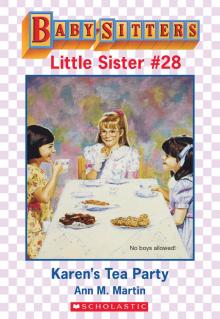 Karen's Tea Party
Karen's Tea Party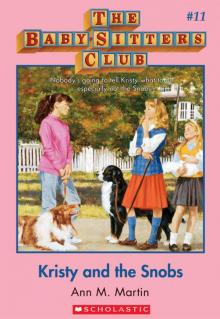 Kristy and the Snobs
Kristy and the Snobs Best Kept Secret
Best Kept Secret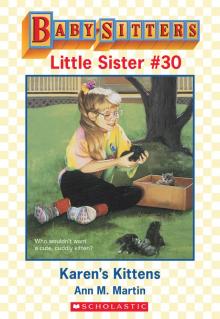 Karen's Kittens
Karen's Kittens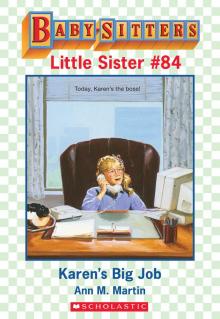 Karen's Big Job
Karen's Big Job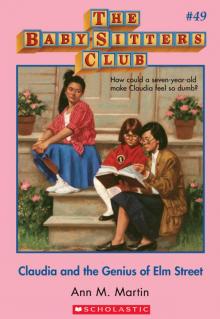 Claudia and the Genius of Elm Street
Claudia and the Genius of Elm Street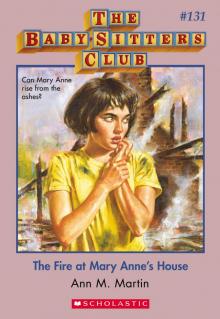 The Fire at Mary Anne's House
The Fire at Mary Anne's House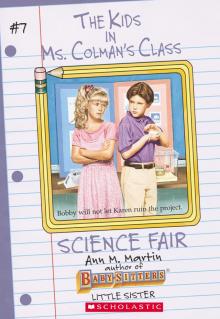 Science Fair
Science Fair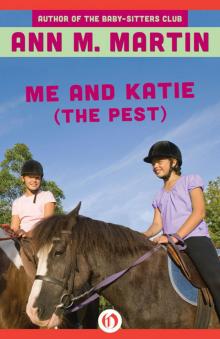 Me and Katie (The Pest)
Me and Katie (The Pest)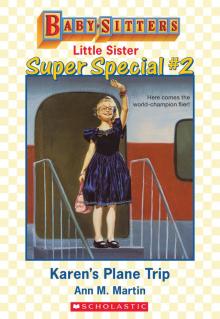 Karen's Plane Trip
Karen's Plane Trip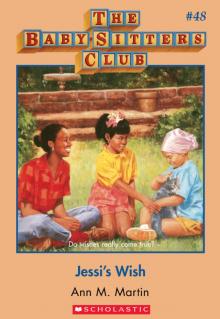 Jessi's Wish
Jessi's Wish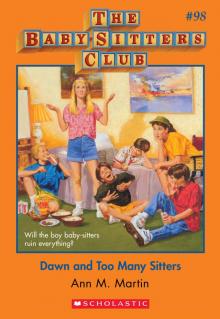 Dawn and Too Many Sitters
Dawn and Too Many Sitters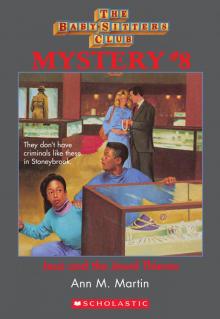 Jessi and the Jewel Thieves
Jessi and the Jewel Thieves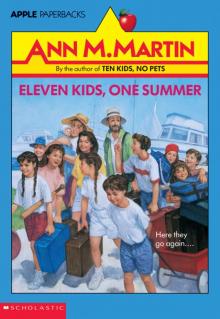 Eleven Kids, One Summer
Eleven Kids, One Summer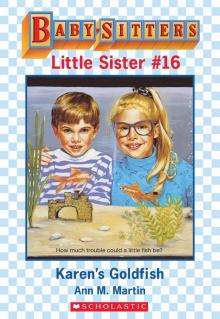 Karen's Goldfish
Karen's Goldfish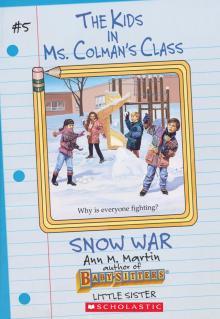 Snow War
Snow War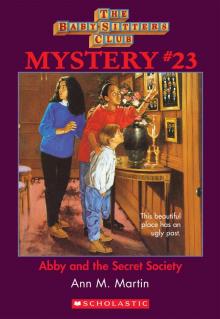 Abby and the Secret Society
Abby and the Secret Society Keeping Secrets
Keeping Secrets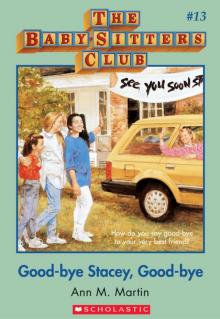 Good-Bye Stacey, Good-Bye
Good-Bye Stacey, Good-Bye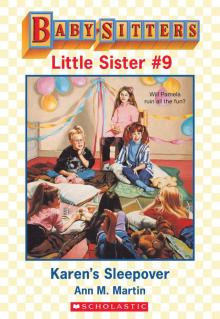 Karen's Sleepover
Karen's Sleepover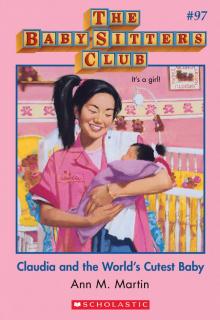 Claudia and the World's Cutest Baby
Claudia and the World's Cutest Baby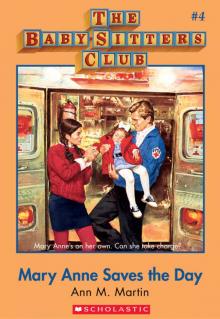 Mary Anne Saves the Day
Mary Anne Saves the Day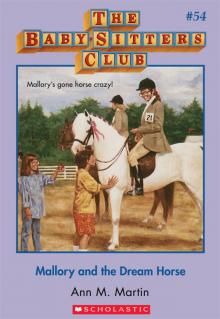 Mallory and the Dream Horse
Mallory and the Dream Horse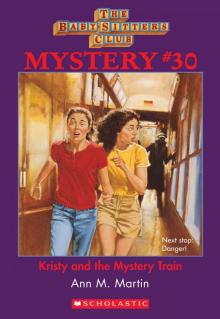 Kristy and the Mystery Train
Kristy and the Mystery Train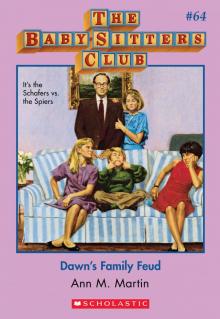 Dawn's Family Feud
Dawn's Family Feud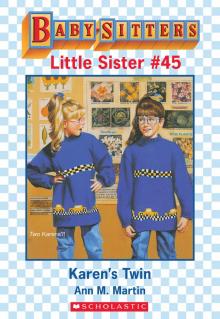 Karen's Twin
Karen's Twin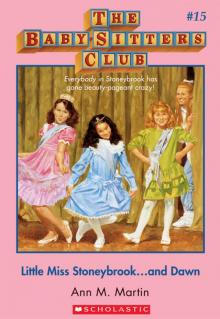 Little Miss Stoneybrook... And Dawn
Little Miss Stoneybrook... And Dawn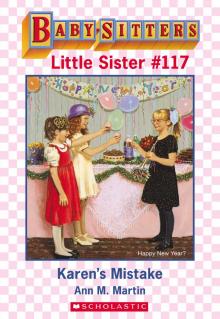 Karen's Mistake
Karen's Mistake Karen's Movie Star
Karen's Movie Star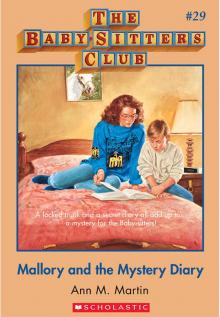 Mallory and the Mystery Diary
Mallory and the Mystery Diary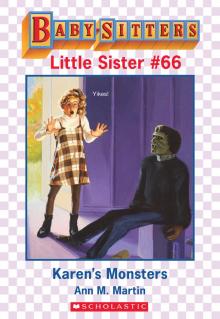 Karen's Monsters
Karen's Monsters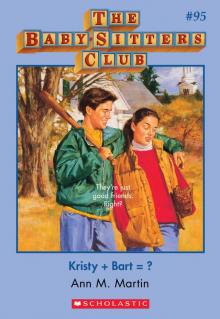 Kristy + Bart = ?
Kristy + Bart = ?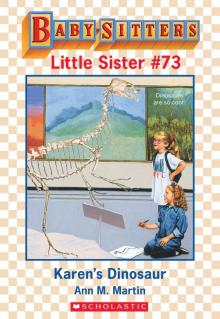 Karen's Dinosaur
Karen's Dinosaur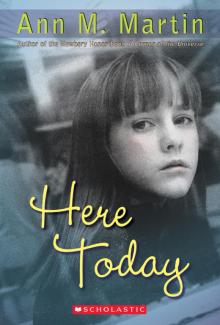 Here Today
Here Today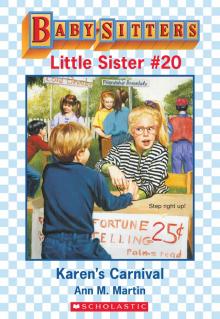 Karen's Carnival
Karen's Carnival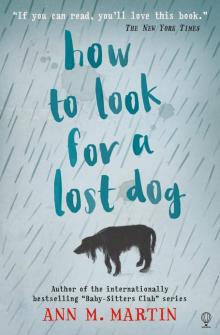 How to Look for a Lost Dog
How to Look for a Lost Dog Stacey vs. Claudia
Stacey vs. Claudia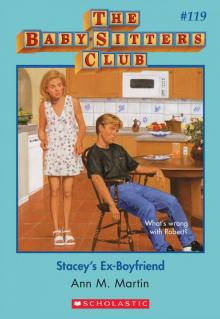 Stacey's Ex-Boyfriend
Stacey's Ex-Boyfriend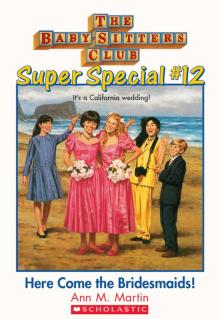 Here Come the Bridesmaids!
Here Come the Bridesmaids! Graduation Day
Graduation Day Kristy's Big News
Kristy's Big News Karen's School Surprise
Karen's School Surprise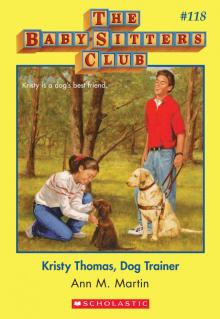 Kristy Thomas, Dog Trainer
Kristy Thomas, Dog Trainer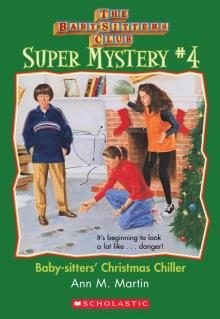 Baby-Sitters' Christmas Chiller
Baby-Sitters' Christmas Chiller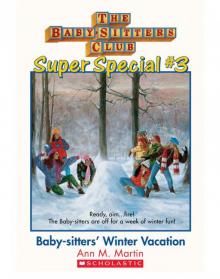 Baby-Sitters' Winter Vacation
Baby-Sitters' Winter Vacation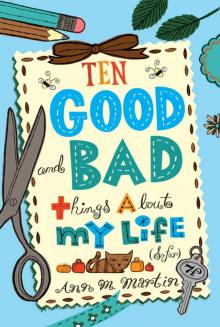 Ten Good and Bad Things About My Life
Ten Good and Bad Things About My Life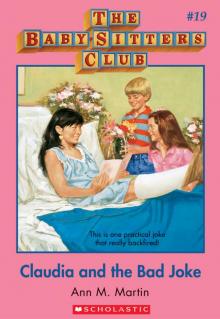 Claudia and the Bad Joke
Claudia and the Bad Joke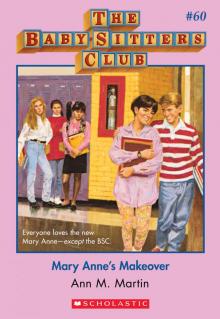 Mary Anne's Makeover
Mary Anne's Makeover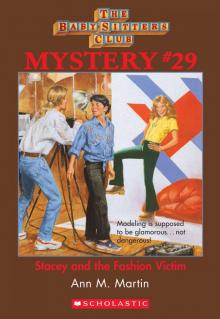 Stacey and the Fashion Victim
Stacey and the Fashion Victim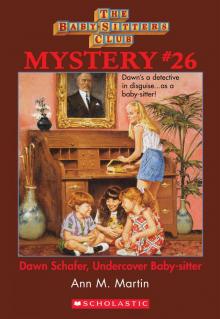 Dawn Schafer, Undercover Baby-Sitter
Dawn Schafer, Undercover Baby-Sitter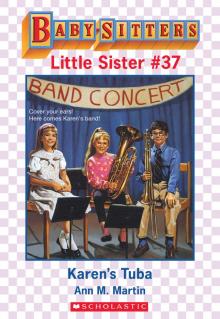 Karen's Tuba
Karen's Tuba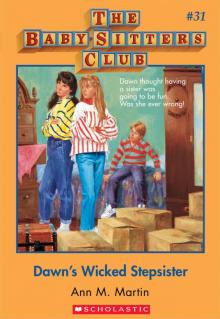 Dawn's Wicked Stepsister
Dawn's Wicked Stepsister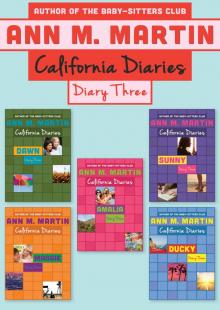 Diary Three: Dawn, Sunny, Maggie, Amalia, and Ducky
Diary Three: Dawn, Sunny, Maggie, Amalia, and Ducky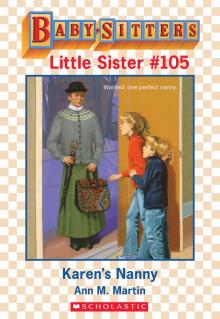 Karen's Nanny
Karen's Nanny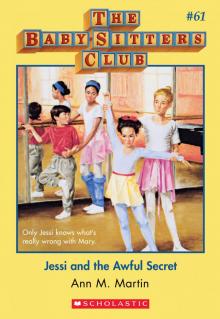 Jessi and the Awful Secret
Jessi and the Awful Secret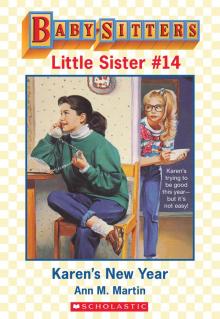 Karen's New Year
Karen's New Year Karen's Candy
Karen's Candy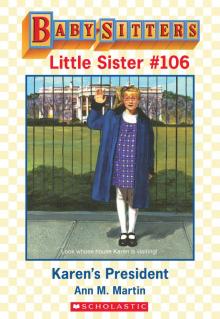 Karen's President
Karen's President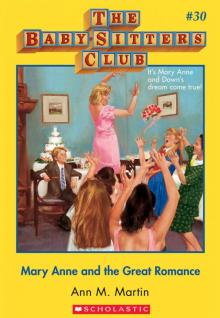 Mary Anne and the Great Romance
Mary Anne and the Great Romance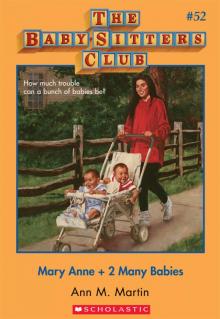 Mary Anne + 2 Many Babies
Mary Anne + 2 Many Babies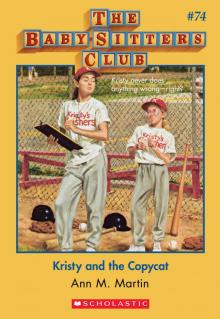 Kristy and the Copycat
Kristy and the Copycat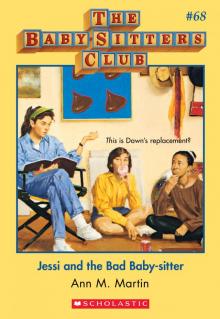 Jessi and the Bad Baby-Sitter
Jessi and the Bad Baby-Sitter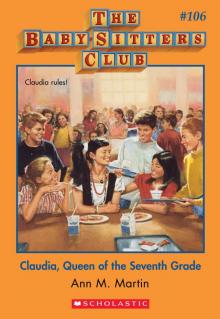 Claudia, Queen of the Seventh Grade
Claudia, Queen of the Seventh Grade Claudia and the Lighthouse Ghost
Claudia and the Lighthouse Ghost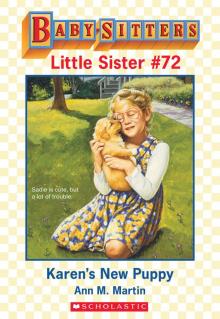 Karen's New Puppy
Karen's New Puppy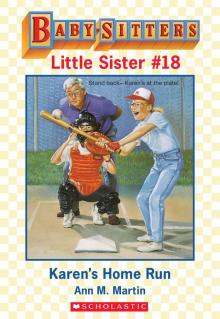 Karen's Home Run
Karen's Home Run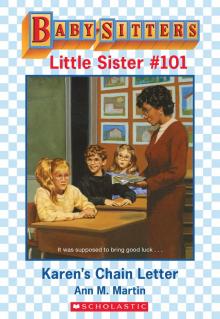 Karen's Chain Letter
Karen's Chain Letter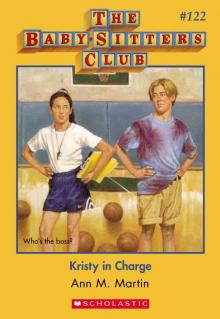 Kristy in Charge
Kristy in Charge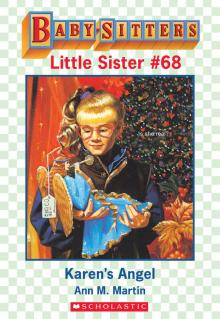 Karen's Angel
Karen's Angel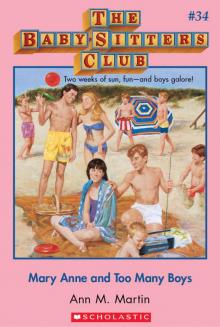 Mary Anne and Too Many Boys
Mary Anne and Too Many Boys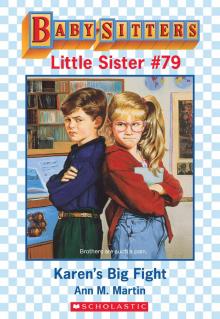 Karen's Big Fight
Karen's Big Fight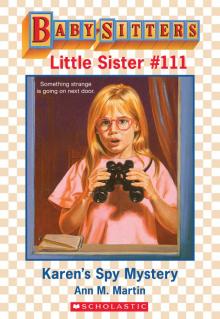 Karen's Spy Mystery
Karen's Spy Mystery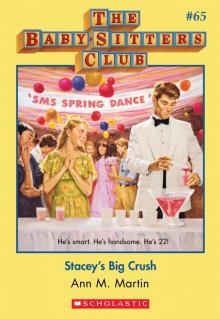 Stacey's Big Crush
Stacey's Big Crush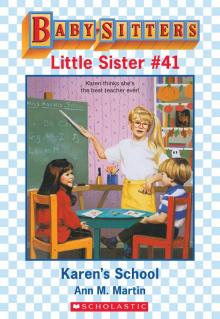 Karen's School
Karen's School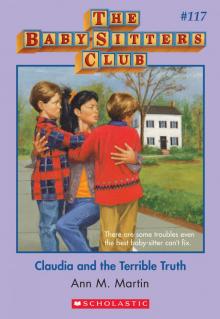 Claudia and the Terrible Truth
Claudia and the Terrible Truth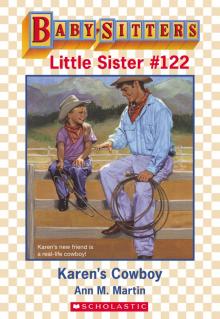 Karen's Cowboy
Karen's Cowboy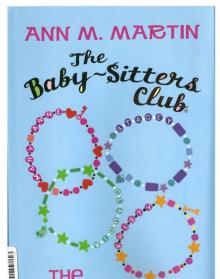 The Summer Before
The Summer Before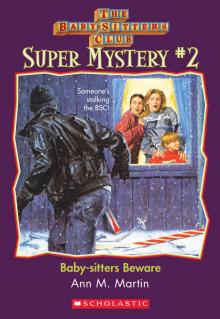 Beware, Dawn!
Beware, Dawn!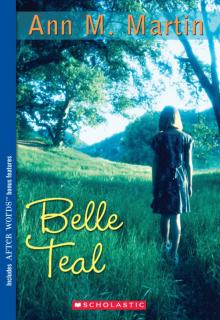 Belle Teale
Belle Teale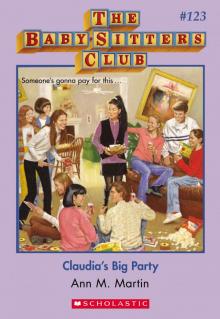 Claudia's Big Party
Claudia's Big Party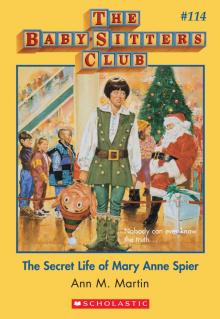 The Secret Life of Mary Anne Spier
The Secret Life of Mary Anne Spier Karen's Book
Karen's Book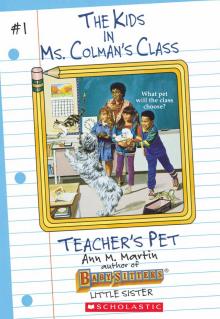 Teacher's Pet
Teacher's Pet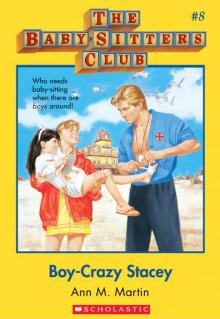 Boy-Crazy Stacey
Boy-Crazy Stacey Claudia and the Disaster Date
Claudia and the Disaster Date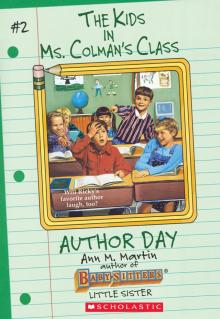 Author Day
Author Day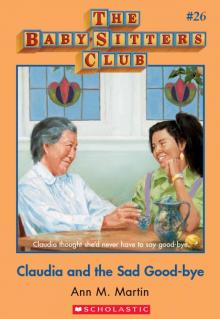 Claudia and the Sad Good-Bye
Claudia and the Sad Good-Bye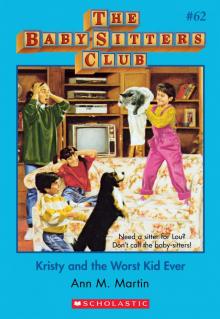 Kristy and the Worst Kid Ever
Kristy and the Worst Kid Ever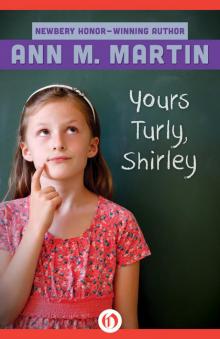 Yours Turly, Shirley
Yours Turly, Shirley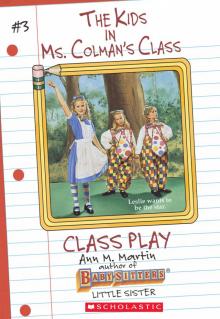 Class Play
Class Play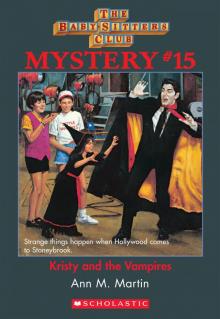 Kristy and the Vampires
Kristy and the Vampires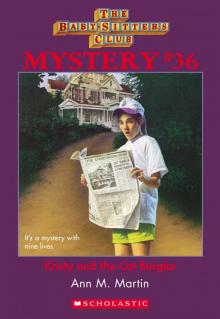 Kristy and the Cat Burglar
Kristy and the Cat Burglar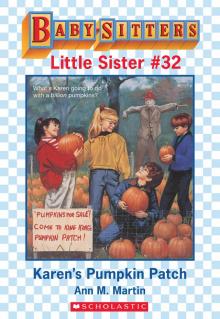 Karen's Pumpkin Patch
Karen's Pumpkin Patch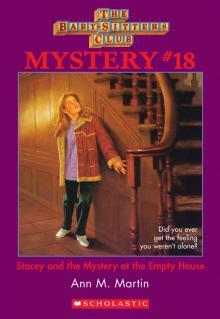 Stacey and the Mystery at the Empty House
Stacey and the Mystery at the Empty House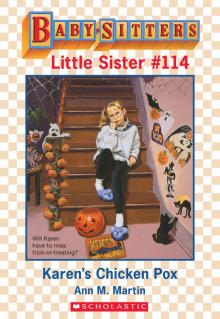 Karen's Chicken Pox
Karen's Chicken Pox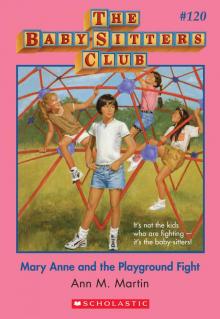 Mary Anne and the Playground Fight
Mary Anne and the Playground Fight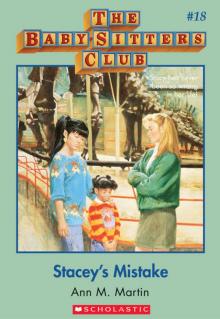 Stacey's Mistake
Stacey's Mistake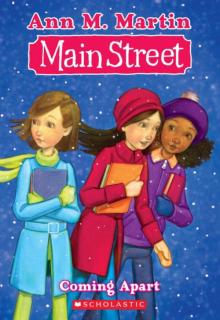 Coming Apart
Coming Apart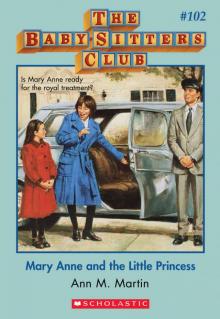 Mary Anne and the Little Princess
Mary Anne and the Little Princess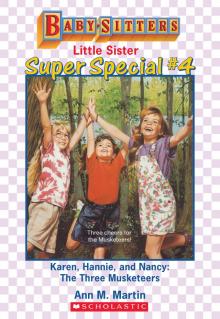 Karen, Hannie and Nancy: The Three Musketeers
Karen, Hannie and Nancy: The Three Musketeers 'Tis the Season
'Tis the Season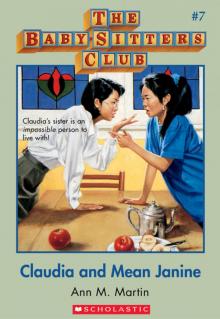 Claudia and Mean Janine
Claudia and Mean Janine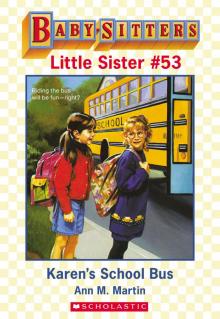 Karen's School Bus
Karen's School Bus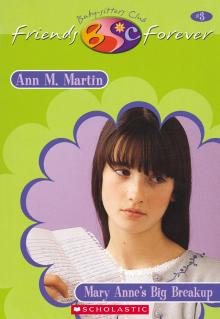 Mary Anne's Big Breakup
Mary Anne's Big Breakup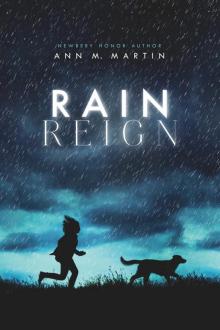 Rain Reign
Rain Reign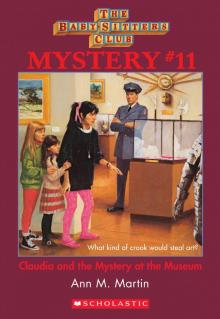 Claudia and the Mystery at the Museum
Claudia and the Mystery at the Museum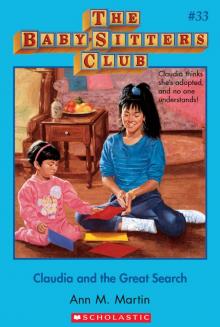 Claudia and the Great Search
Claudia and the Great Search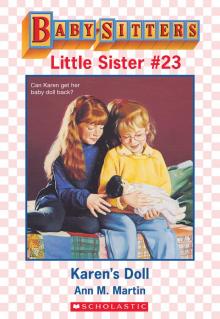 Karen's Doll
Karen's Doll Shannon's Story
Shannon's Story Sea City, Here We Come!
Sea City, Here We Come!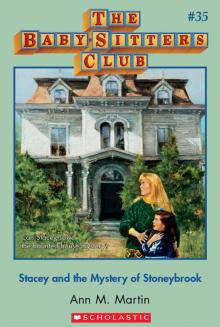 Stacey and the Mystery of Stoneybrook
Stacey and the Mystery of Stoneybrook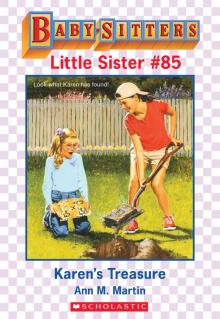 Karen's Treasure
Karen's Treasure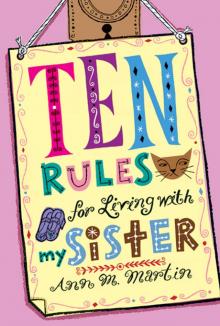 Ten Rules for Living With My Sister
Ten Rules for Living With My Sister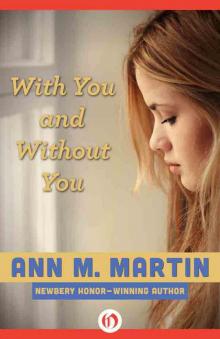 With You and Without You
With You and Without You Baby-Sitters' Island Adventure
Baby-Sitters' Island Adventure Karen's Fishing Trip
Karen's Fishing Trip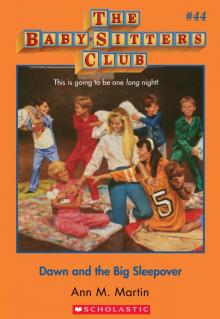 Dawn and the Big Sleepover
Dawn and the Big Sleepover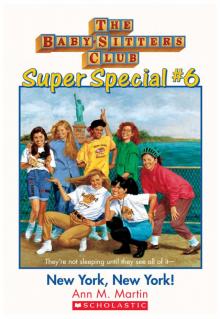 New York, New York!
New York, New York!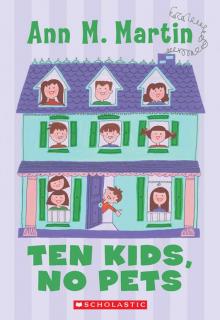 Ten Kids, No Pets
Ten Kids, No Pets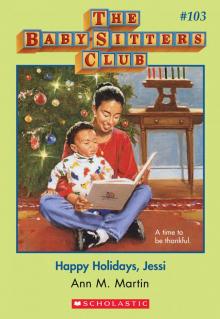 Happy Holidays, Jessi
Happy Holidays, Jessi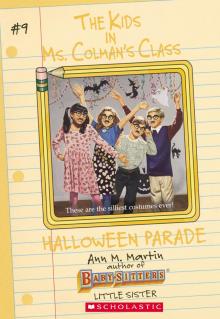 Halloween Parade
Halloween Parade Karen's New Holiday
Karen's New Holiday Kristy Power!
Kristy Power!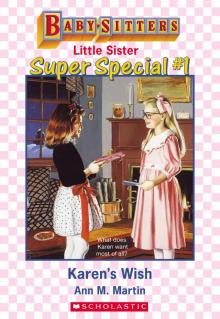 Karen's Wish
Karen's Wish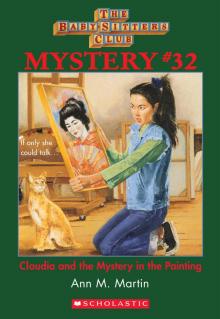 Claudia and the Mystery in the Painting
Claudia and the Mystery in the Painting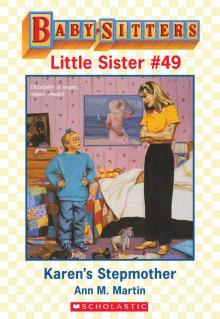 Karen's Stepmother
Karen's Stepmother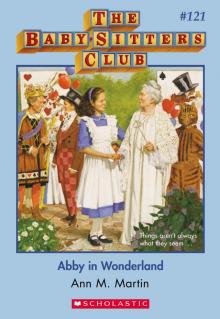 Abby in Wonderland
Abby in Wonderland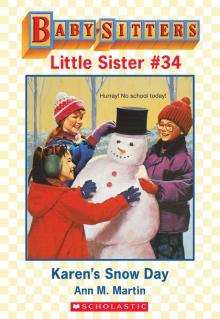 Karen's Snow Day
Karen's Snow Day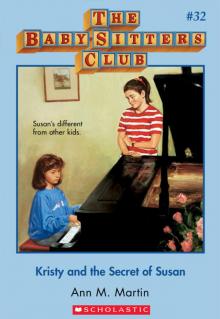 Kristy and the Secret of Susan
Kristy and the Secret of Susan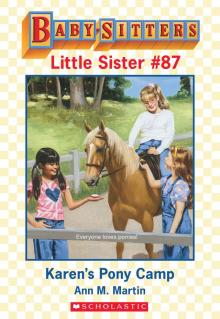 Karen's Pony Camp
Karen's Pony Camp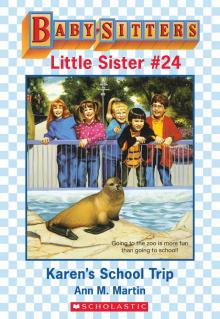 Karen's School Trip
Karen's School Trip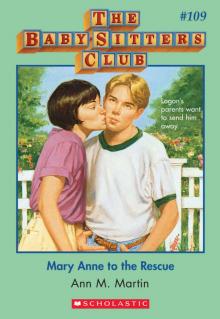 Mary Anne to the Rescue
Mary Anne to the Rescue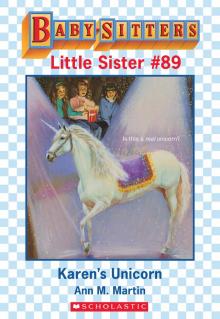 Karen's Unicorn
Karen's Unicorn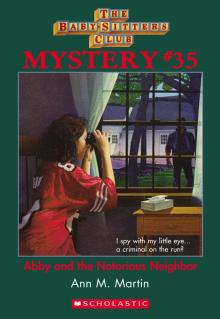 Abby and the Notorious Neighbor
Abby and the Notorious Neighbor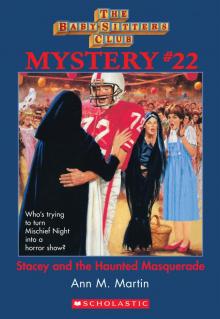 Stacey and the Haunted Masquerade
Stacey and the Haunted Masquerade Claudia Gets Her Guy
Claudia Gets Her Guy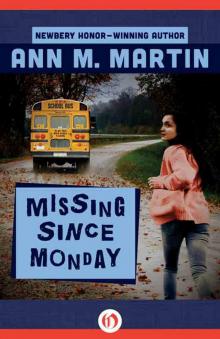 Missing Since Monday
Missing Since Monday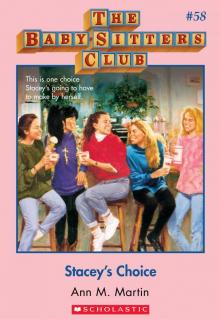 Stacey's Choice
Stacey's Choice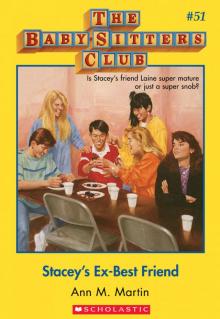 Stacey's Ex-Best Friend
Stacey's Ex-Best Friend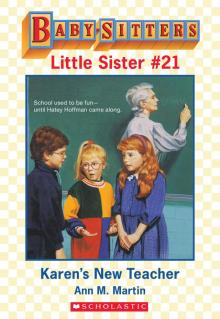 Karen's New Teacher
Karen's New Teacher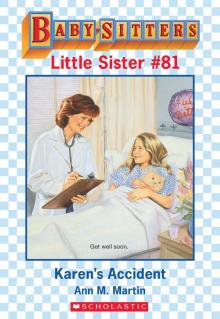 Karen's Accident
Karen's Accident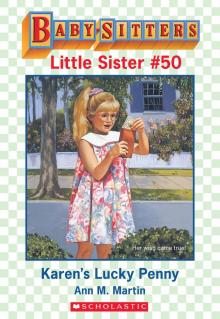 Karen's Lucky Penny
Karen's Lucky Penny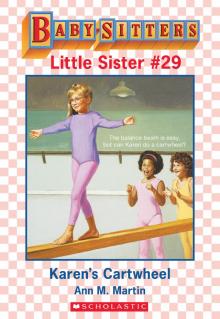 Karen's Cartwheel
Karen's Cartwheel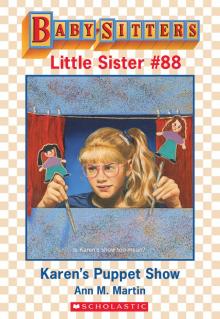 Karen's Puppet Show
Karen's Puppet Show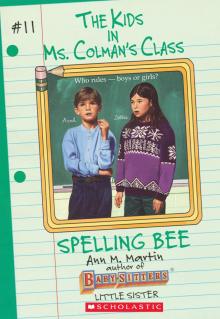 Spelling Bee
Spelling Bee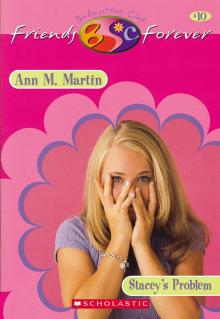 Stacey's Problem
Stacey's Problem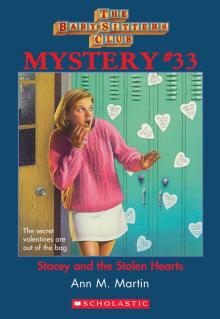 Stacey and the Stolen Hearts
Stacey and the Stolen Hearts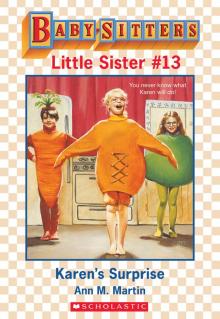 Karen's Surprise
Karen's Surprise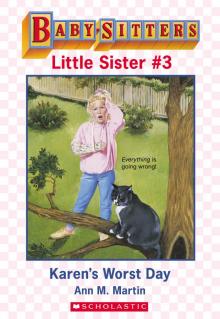 Karen's Worst Day
Karen's Worst Day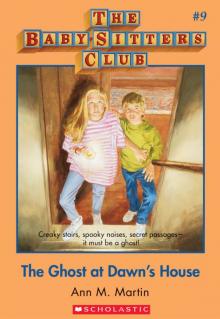 The Ghost at Dawn's House
The Ghost at Dawn's House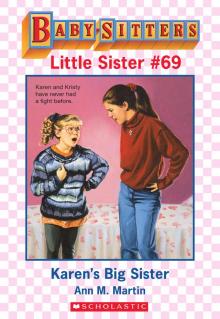 Karen's Big Sister
Karen's Big Sister Karen's Easter Parade
Karen's Easter Parade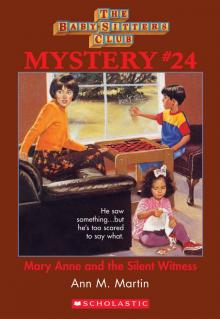 Mary Anne and the Silent Witness
Mary Anne and the Silent Witness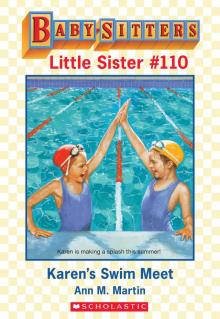 Karen's Swim Meet
Karen's Swim Meet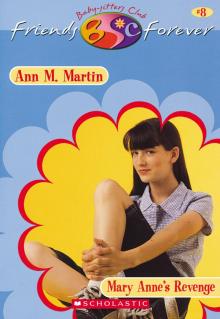 Mary Anne's Revenge
Mary Anne's Revenge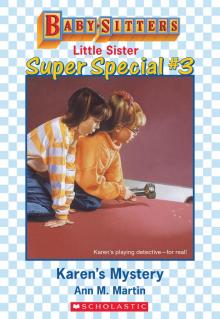 Karen's Mystery
Karen's Mystery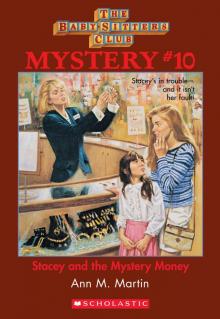 Stacey and the Mystery Money
Stacey and the Mystery Money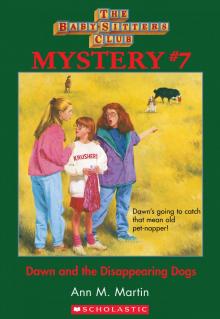 Dawn and the Disappearing Dogs
Dawn and the Disappearing Dogs Karen's Christmas Tree
Karen's Christmas Tree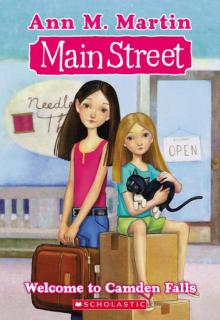 Welcome to Camden Falls
Welcome to Camden Falls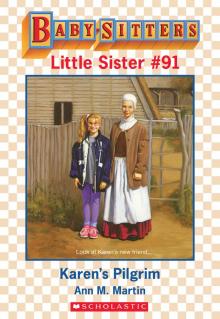 Karen's Pilgrim
Karen's Pilgrim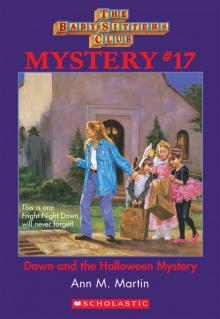 Dawn and the Halloween Mystery
Dawn and the Halloween Mystery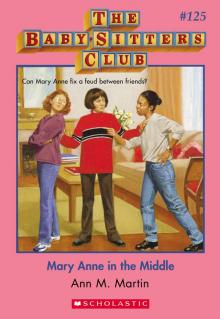 Mary Anne in the Middle
Mary Anne in the Middle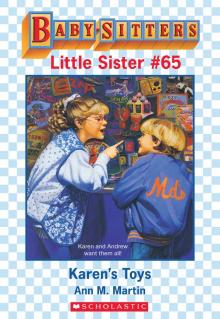 Karen's Toys
Karen's Toys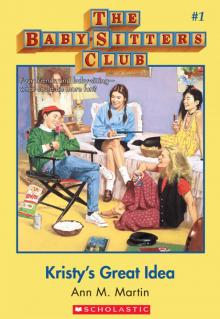 Kristy's Great Idea
Kristy's Great Idea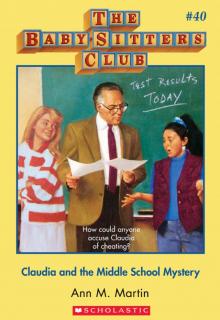 Claudia and the Middle School Mystery
Claudia and the Middle School Mystery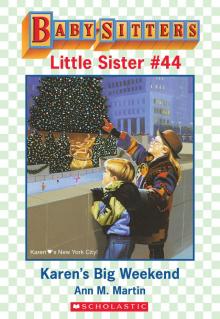 Karen's Big Weekend
Karen's Big Weekend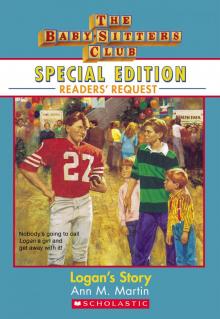 Logan's Story
Logan's Story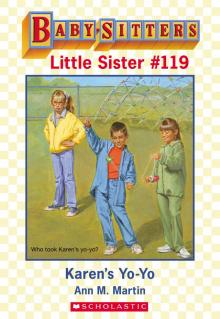 Karen's Yo-Yo
Karen's Yo-Yo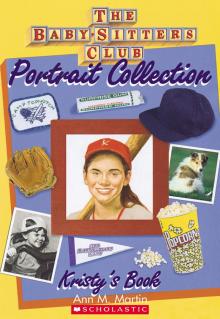 Kristy's Book
Kristy's Book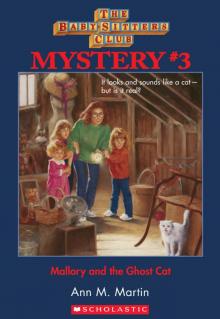 Mallory and the Ghost Cat
Mallory and the Ghost Cat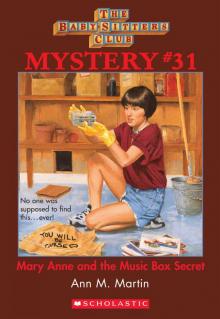 Mary Anne and the Music
Mary Anne and the Music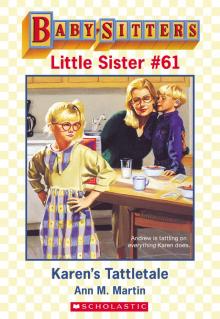 Karen's Tattletale
Karen's Tattletale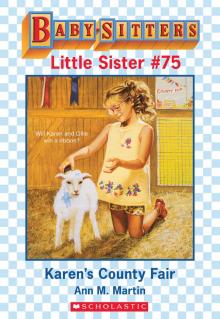 Karen's County Fair
Karen's County Fair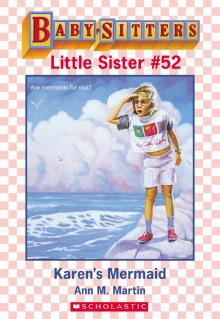 Karen's Mermaid
Karen's Mermaid Snowbound
Snowbound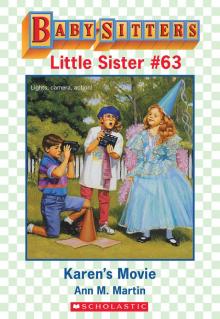 Karen's Movie
Karen's Movie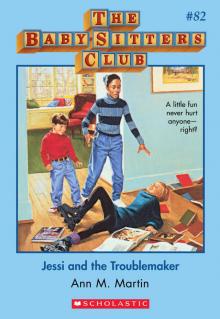 Jessi and the Troublemaker
Jessi and the Troublemaker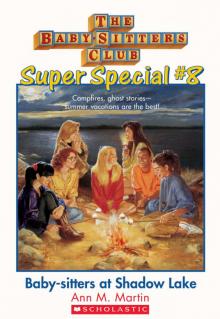 Baby-Sitters at Shadow Lake
Baby-Sitters at Shadow Lake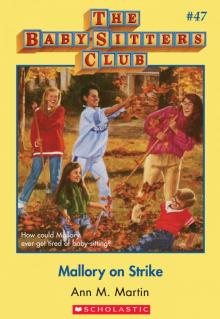 Mallory on Strike
Mallory on Strike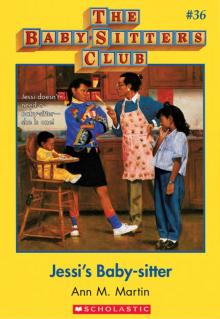 Jessi's Baby-Sitter
Jessi's Baby-Sitter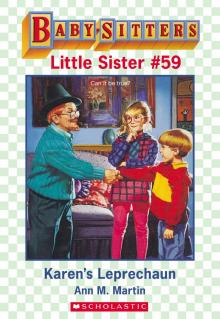 Karen's Leprechaun
Karen's Leprechaun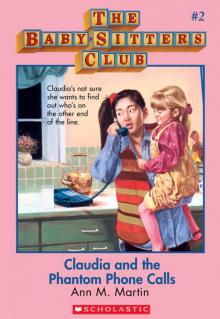 Claudia and the Phantom Phone Calls
Claudia and the Phantom Phone Calls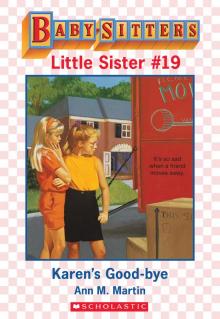 Karen's Good-Bye
Karen's Good-Bye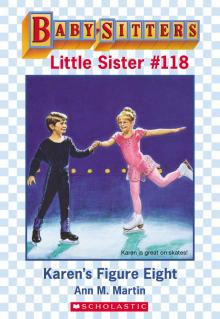 Karen's Figure Eight
Karen's Figure Eight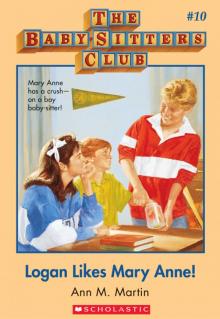 Logan Likes Mary Anne!
Logan Likes Mary Anne!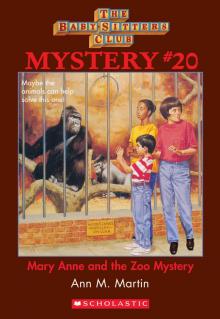 Mary Anne and the Zoo Mystery
Mary Anne and the Zoo Mystery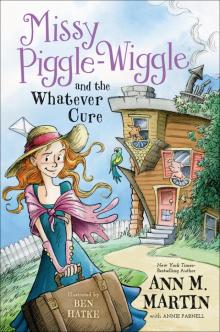 Missy Piggle-Wiggle and the Whatever Cure
Missy Piggle-Wiggle and the Whatever Cure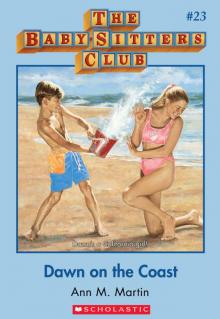 Dawn on the Coast
Dawn on the Coast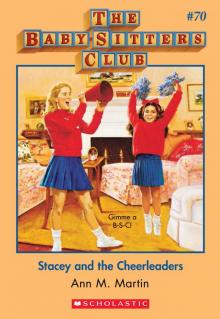 Stacey and the Cheerleaders
Stacey and the Cheerleaders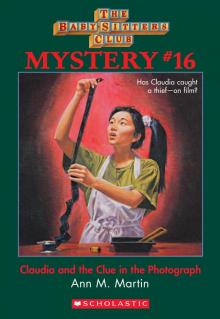 Claudia and the Clue in the Photograph
Claudia and the Clue in the Photograph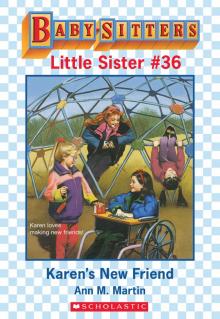 Karen's New Friend
Karen's New Friend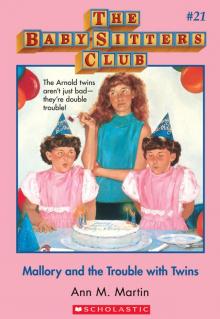 Mallory and the Trouble With Twins
Mallory and the Trouble With Twins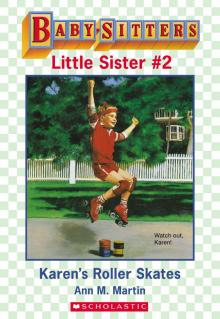 Karen's Roller Skates
Karen's Roller Skates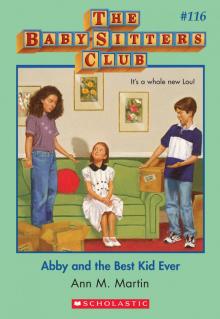 Abby and the Best Kid Ever
Abby and the Best Kid Ever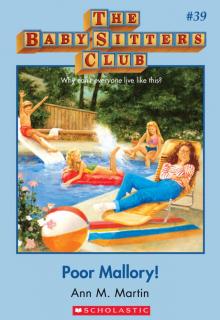 Poor Mallory!
Poor Mallory!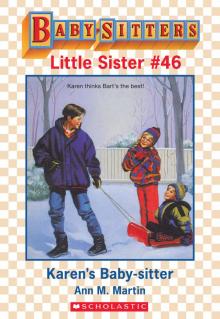 Karen's Witch
Karen's Witch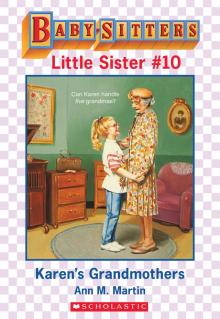 Karen's Grandmothers
Karen's Grandmothers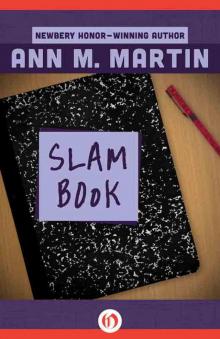 Slam Book
Slam Book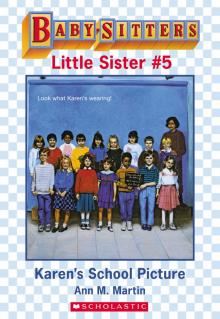 Karen's School Picture
Karen's School Picture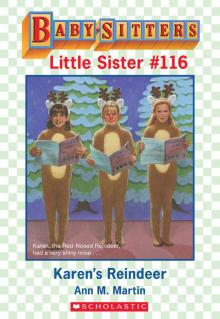 Karen's Reindeer
Karen's Reindeer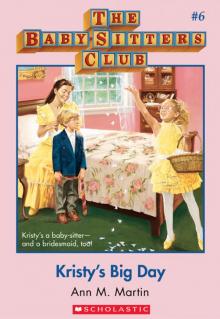 Kristy's Big Day
Kristy's Big Day The Long Way Home
The Long Way Home Karen's Sleigh Ride
Karen's Sleigh Ride On Christmas Eve
On Christmas Eve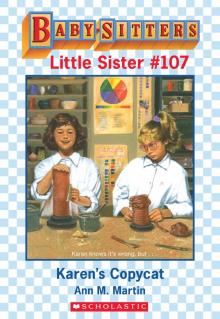 Karen's Copycat
Karen's Copycat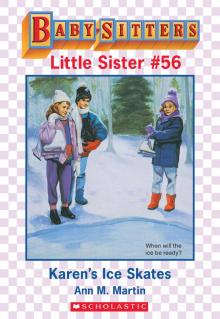 Karen's Ice Skates
Karen's Ice Skates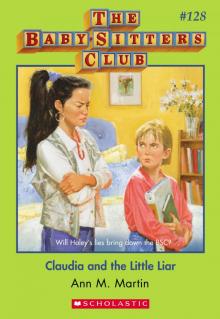 Claudia and the Little Liar
Claudia and the Little Liar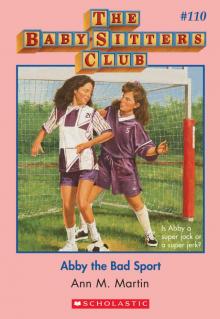 Abby the Bad Sport
Abby the Bad Sport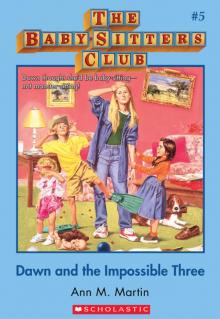 The Baby-Sitters Club #5: Dawn and the Impossible Three
The Baby-Sitters Club #5: Dawn and the Impossible Three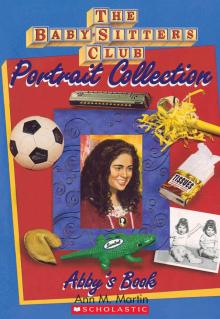 Abby's Book
Abby's Book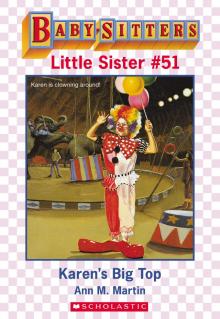 Karen's Big Top
Karen's Big Top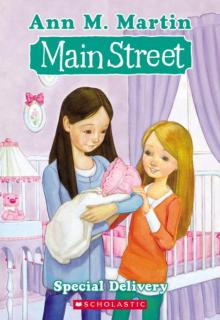 Main Street #8: Special Delivery
Main Street #8: Special Delivery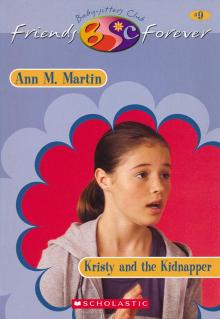 Kristy and the Kidnapper
Kristy and the Kidnapper Karen's Ski Trip
Karen's Ski Trip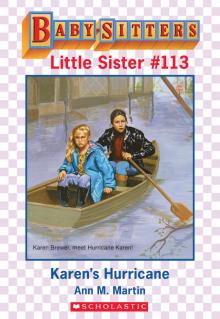 Karen's Hurricane
Karen's Hurricane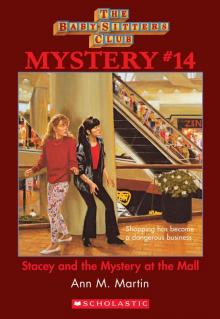 Stacey and the Mystery at the Mall
Stacey and the Mystery at the Mall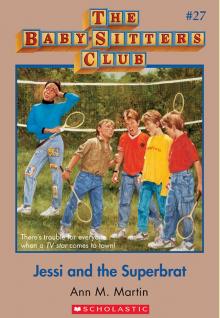 Jessi and the Superbrat
Jessi and the Superbrat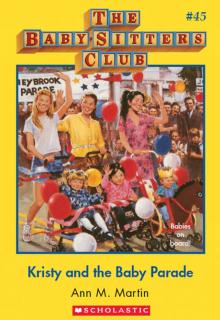 Kristy and the Baby Parade
Kristy and the Baby Parade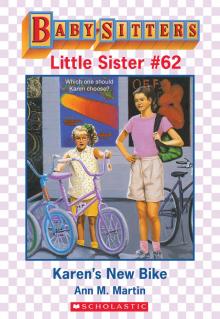 Karen's New Bike
Karen's New Bike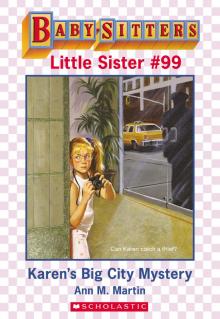 Karen's Big City Mystery
Karen's Big City Mystery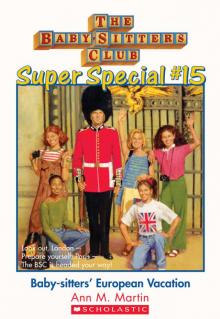 Baby-Sitters' European Vacation
Baby-Sitters' European Vacation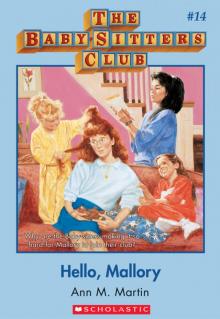 Hello, Mallory
Hello, Mallory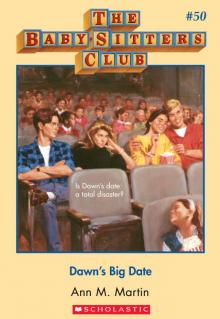 Dawn's Big Date
Dawn's Big Date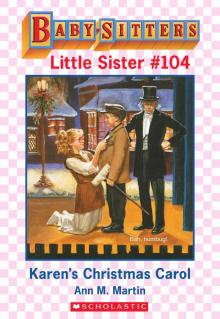 Karen's Christmas Carol
Karen's Christmas Carol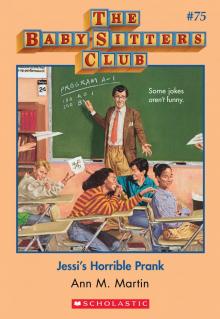 Jessi's Horrible Prank
Jessi's Horrible Prank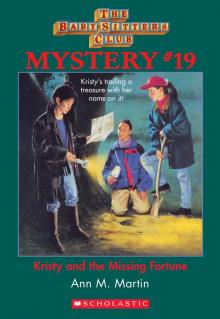 Kristy and the Missing Fortune
Kristy and the Missing Fortune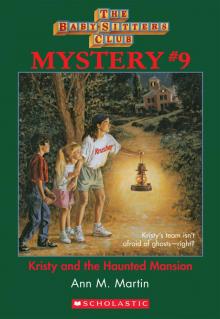 Kristy and the Haunted Mansion
Kristy and the Haunted Mansion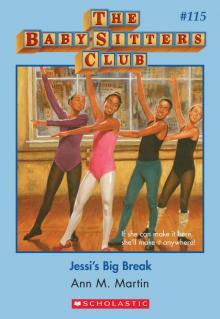 Jessi's Big Break
Jessi's Big Break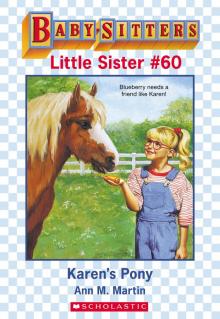 Karen's Pony
Karen's Pony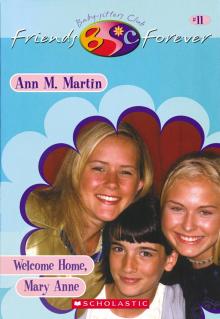 Welcome Home, Mary Anne
Welcome Home, Mary Anne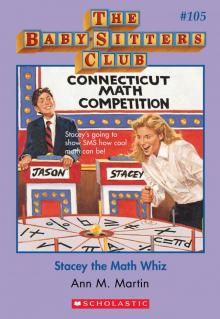 Stacey the Math Whiz
Stacey the Math Whiz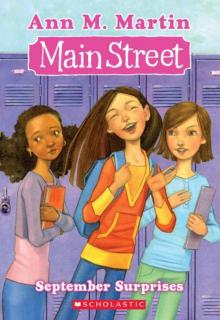 September Surprises
September Surprises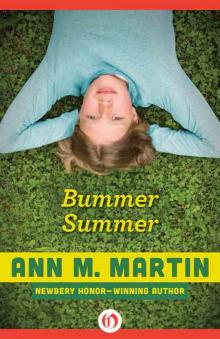 Bummer Summer
Bummer Summer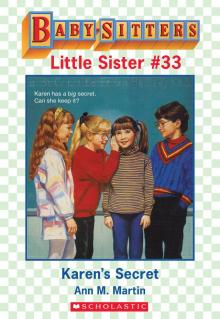 Karen's Secret
Karen's Secret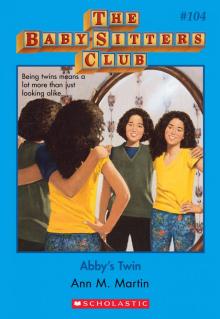 Abby's Twin
Abby's Twin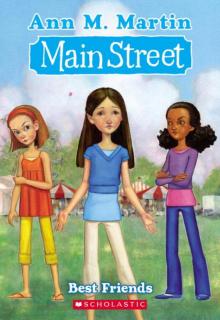 Main Street #4: Best Friends
Main Street #4: Best Friends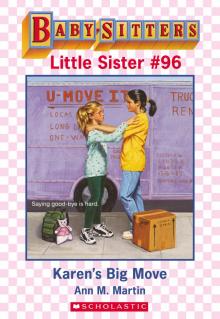 Karen's Big Move
Karen's Big Move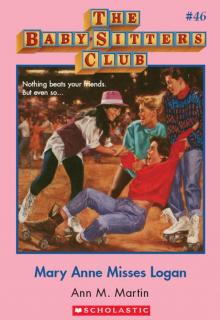 Mary Anne Misses Logan
Mary Anne Misses Logan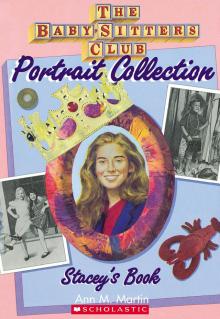 Stacey's Book
Stacey's Book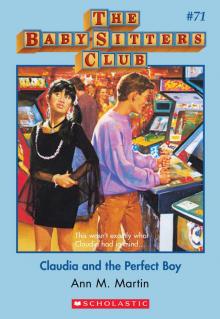 Claudia and the Perfect Boy
Claudia and the Perfect Boy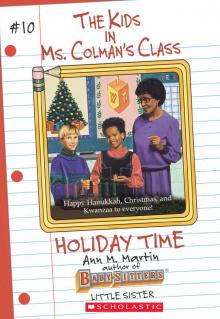 Holiday Time
Holiday Time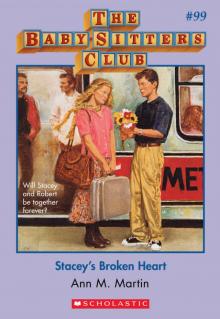 Stacey's Broken Heart
Stacey's Broken Heart Karen's Field Day
Karen's Field Day Kristy's Worst Idea
Kristy's Worst Idea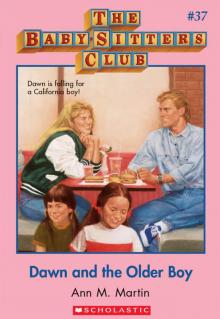 Dawn and the Older Boy
Dawn and the Older Boy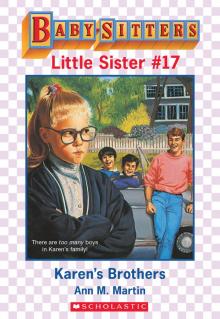 Karen's Brothers
Karen's Brothers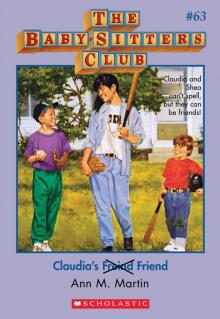 Claudia's Friend
Claudia's Friend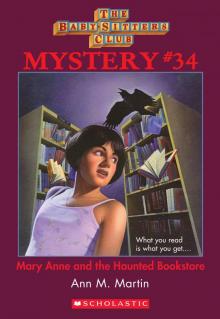 Mary Anne and the Haunted Bookstore
Mary Anne and the Haunted Bookstore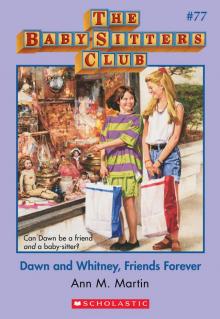 Dawn and Whitney, Friends Forever
Dawn and Whitney, Friends Forever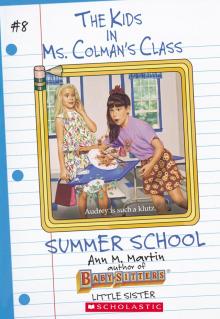 Summer School
Summer School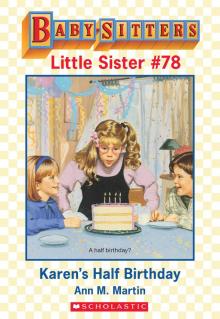 Karen's Birthday
Karen's Birthday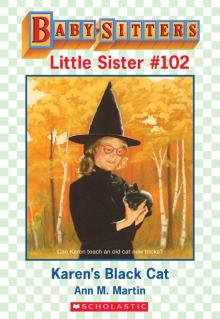 Karen's Black Cat
Karen's Black Cat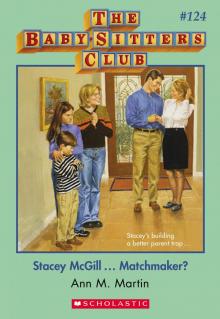 Stacey McGill... Matchmaker?
Stacey McGill... Matchmaker? Claudia's Book
Claudia's Book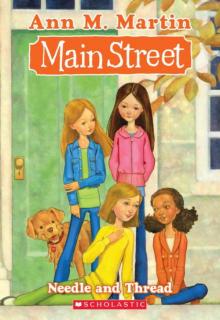 Main Street #2: Needle and Thread
Main Street #2: Needle and Thread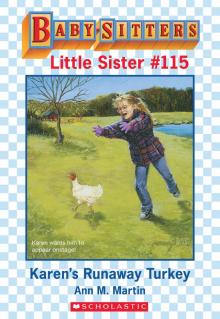 Karen's Runaway Turkey
Karen's Runaway Turkey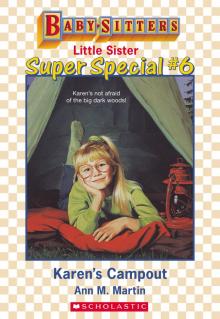 Karen's Campout
Karen's Campout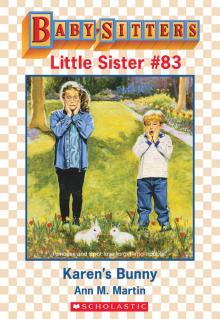 Karen's Bunny
Karen's Bunny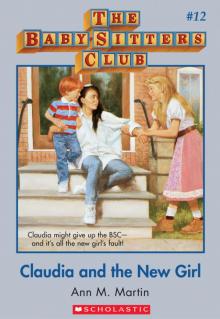 Claudia and the New Girl
Claudia and the New Girl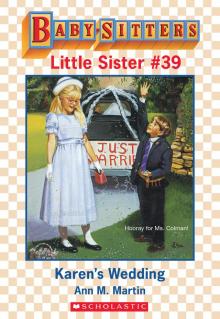 Karen's Wedding
Karen's Wedding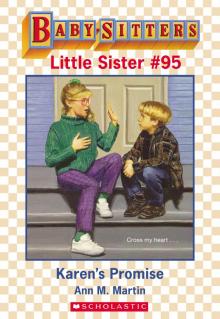 Karen's Promise
Karen's Promise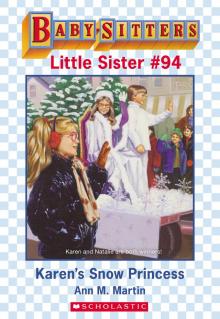 Karen's Snow Princess
Karen's Snow Princess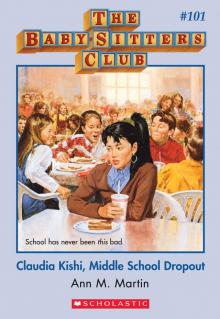 Claudia Kishi, Middle School Dropout
Claudia Kishi, Middle School Dropout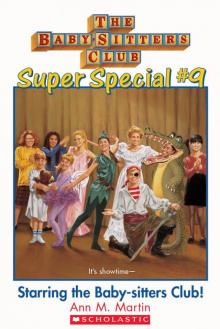 Starring the Baby-Sitters Club!
Starring the Baby-Sitters Club!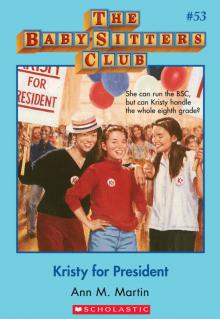 Kristy for President
Kristy for President California Girls!
California Girls!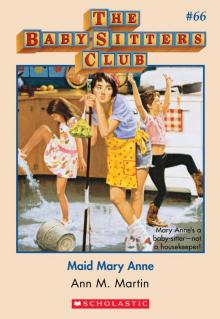 Maid Mary Anne
Maid Mary Anne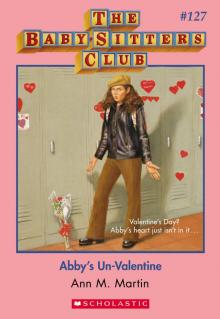 Abby's Un-Valentine
Abby's Un-Valentine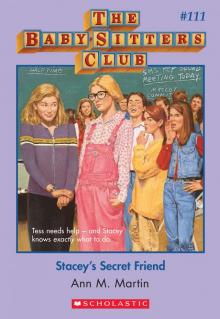 Stacey's Secret Friend
Stacey's Secret Friend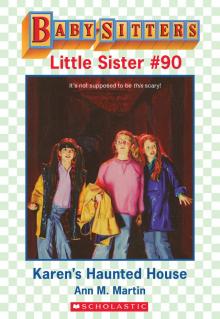 Karen's Haunted House
Karen's Haunted House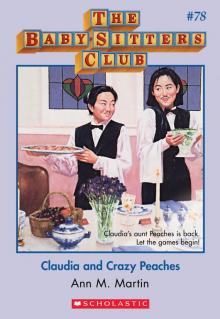 Claudia and Crazy Peaches
Claudia and Crazy Peaches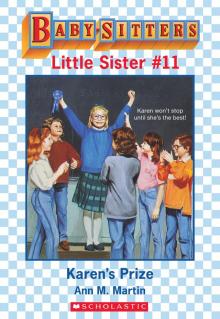 Karen's Prize
Karen's Prize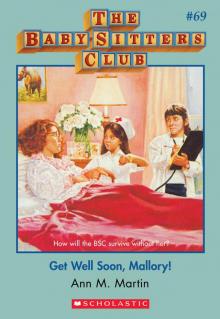 Get Well Soon, Mallory!
Get Well Soon, Mallory!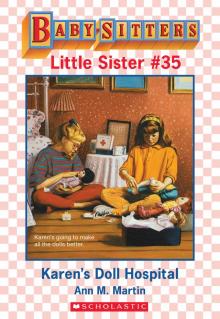 Karen's Doll Hospital
Karen's Doll Hospital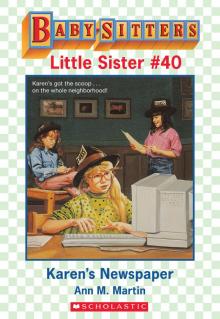 Karen's Newspaper
Karen's Newspaper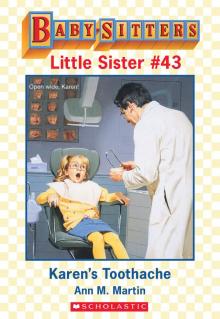 Karen's Toothache
Karen's Toothache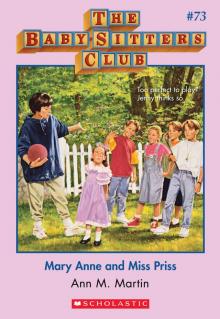 Mary Anne and Miss Priss
Mary Anne and Miss Priss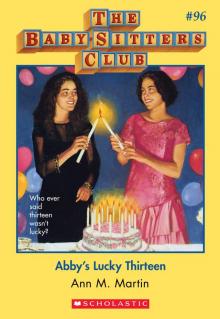 Abby's Lucky Thirteen
Abby's Lucky Thirteen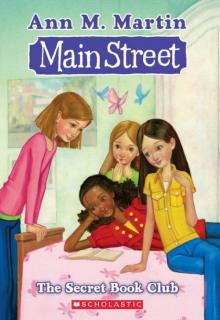 The Secret Book Club
The Secret Book Club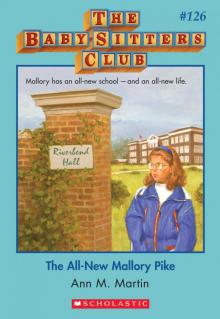 The All-New Mallory Pike
The All-New Mallory Pike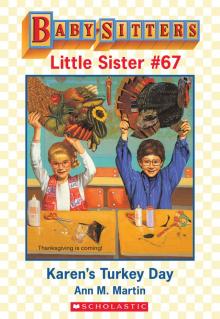 Karen's Turkey Day
Karen's Turkey Day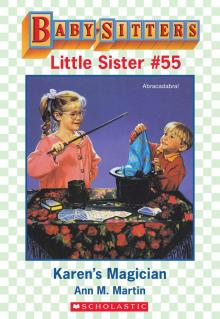 Karen's Magician
Karen's Magician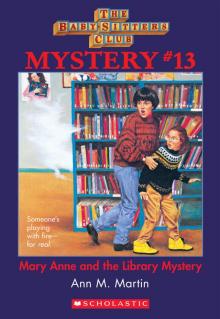 Mary Anne and the Library Mystery
Mary Anne and the Library Mystery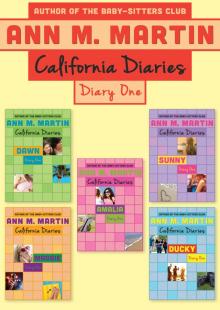 Diary One: Dawn, Sunny, Maggie, Amalia, and Ducky
Diary One: Dawn, Sunny, Maggie, Amalia, and Ducky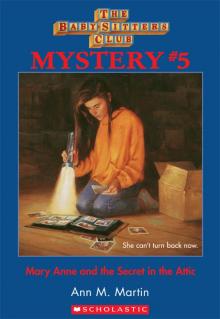 Mary Anne and the Secret in the Attic
Mary Anne and the Secret in the Attic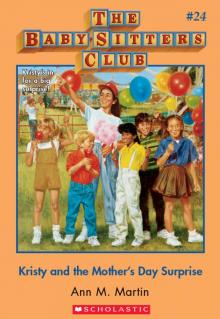 Kristy and the Mother's Day Surprise
Kristy and the Mother's Day Surprise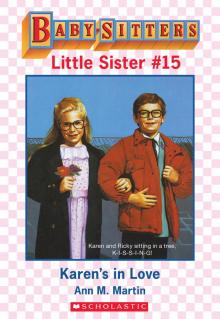 Karen's in Love
Karen's in Love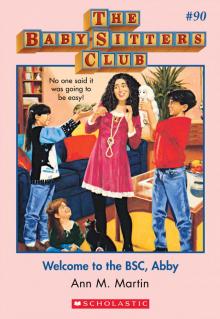 Welcome to the BSC, Abby
Welcome to the BSC, Abby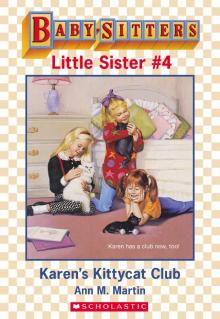 Karen's Kittycat Club
Karen's Kittycat Club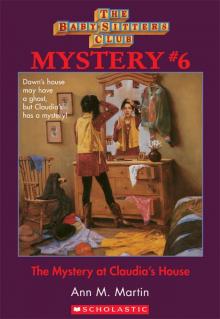 The Mystery at Claudia's House
The Mystery at Claudia's House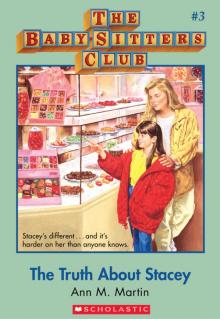 The Truth About Stacey
The Truth About Stacey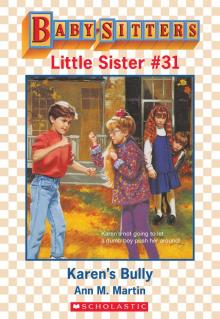 Karen's Bully
Karen's Bully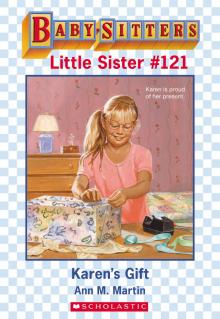 Karen's Gift
Karen's Gift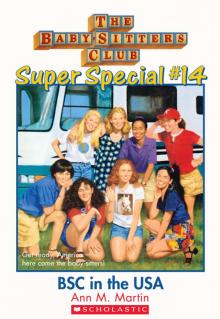 BSC in the USA
BSC in the USA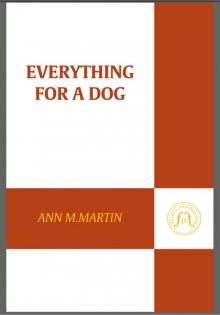 Everything for a Dog
Everything for a Dog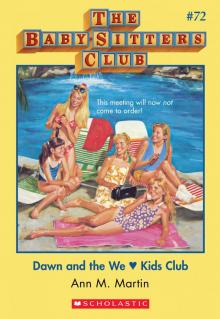 Dawn and the We Love Kids Club
Dawn and the We Love Kids Club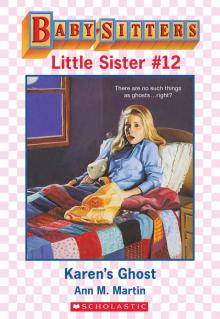 Karen's Ghost
Karen's Ghost Stacey's Lie
Stacey's Lie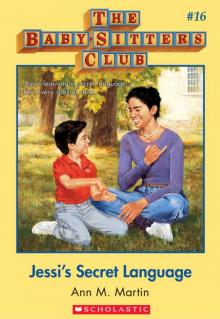 Jessi's Secret Language
Jessi's Secret Language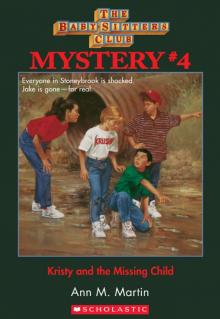 Kristy and the Missing Child
Kristy and the Missing Child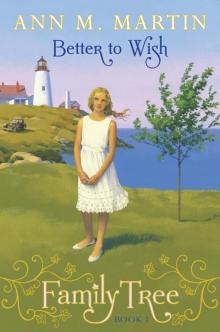 Better to Wish
Better to Wish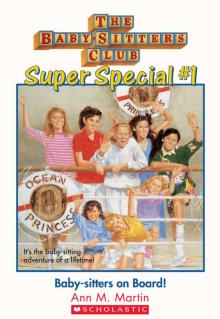 Baby-Sitters on Board!
Baby-Sitters on Board!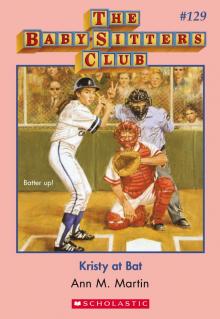 Kristy at Bat
Kristy at Bat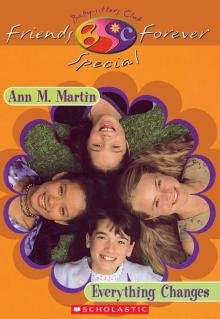 Everything Changes
Everything Changes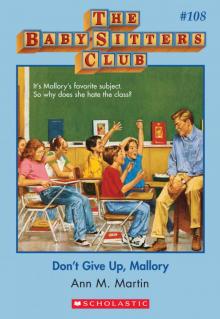 Don't Give Up, Mallory
Don't Give Up, Mallory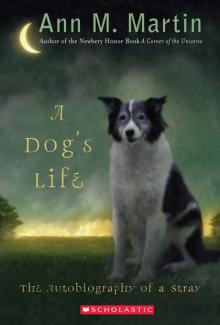 A Dog's Life: The Autobiography of a Stray
A Dog's Life: The Autobiography of a Stray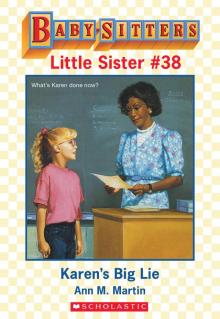 Karen's Big Lie
Karen's Big Lie Karen's Show and Share
Karen's Show and Share Mallory Hates Boys (and Gym)
Mallory Hates Boys (and Gym)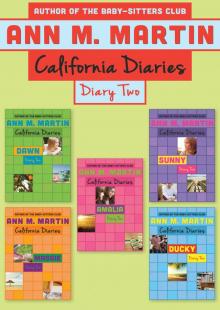 Diary Two: Dawn, Sunny, Maggie, Amalia, and Ducky
Diary Two: Dawn, Sunny, Maggie, Amalia, and Ducky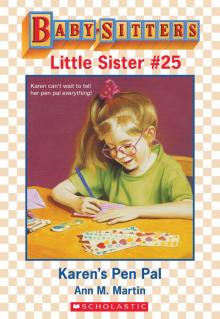 Karen's Pen Pal
Karen's Pen Pal Claudia and the Friendship Feud
Claudia and the Friendship Feud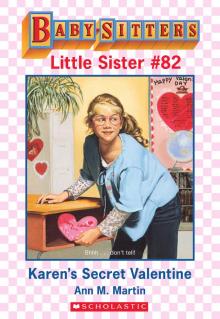 Karen's Secret Valentine
Karen's Secret Valentine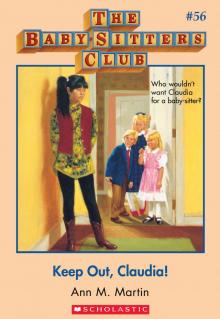 Keep Out, Claudia!
Keep Out, Claudia! Aloha, Baby-Sitters!
Aloha, Baby-Sitters!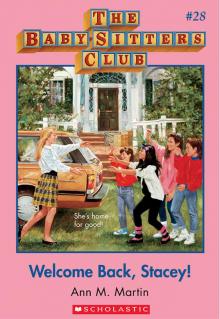 Welcome Back, Stacey
Welcome Back, Stacey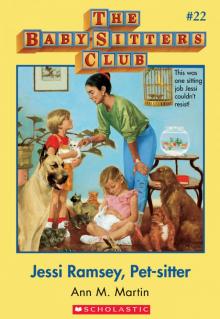 Jessi Ramsey, Pet-Sitter
Jessi Ramsey, Pet-Sitter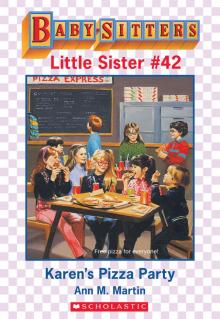 Karen's Pizza Party
Karen's Pizza Party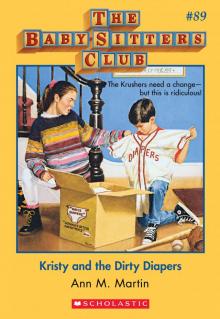 Kristy and the Dirty Diapers
Kristy and the Dirty Diapers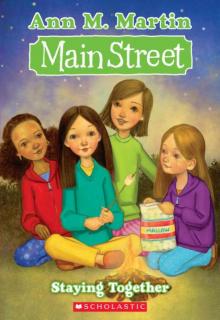 Staying Together
Staying Together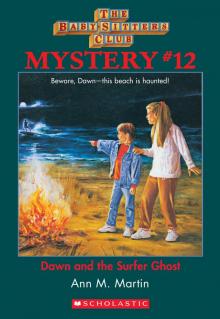 Dawn and the Surfer Ghost
Dawn and the Surfer Ghost Claudia Makes Up Her Mind
Claudia Makes Up Her Mind Jessi's Gold Medal
Jessi's Gold Medal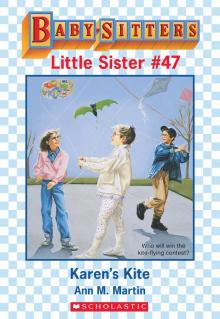 Karen's Kite
Karen's Kite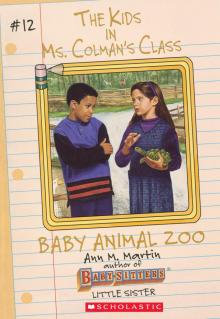 Baby Animal Zoo
Baby Animal Zoo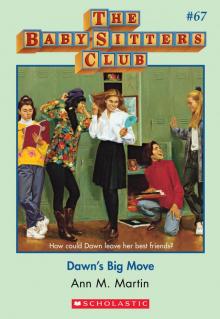 Dawn's Big Move
Dawn's Big Move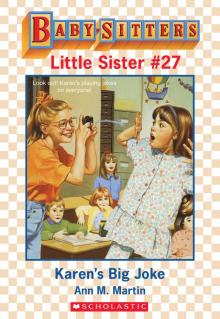 Karen's Big Joke
Karen's Big Joke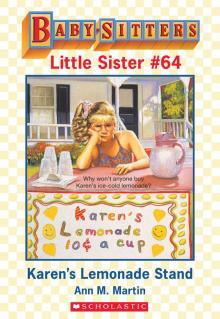 Karen's Lemonade Stand
Karen's Lemonade Stand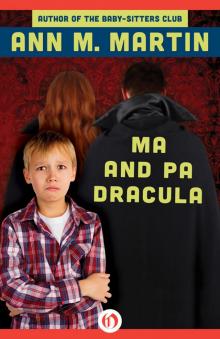 Ma and Pa Dracula
Ma and Pa Dracula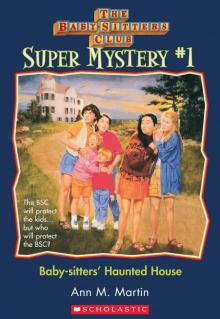 Baby-Sitters' Haunted House
Baby-Sitters' Haunted House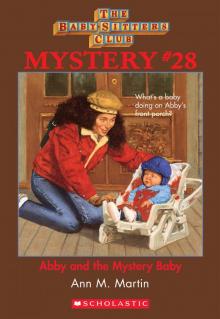 Abby and the Mystery Baby
Abby and the Mystery Baby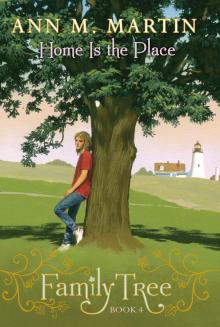 Home Is the Place
Home Is the Place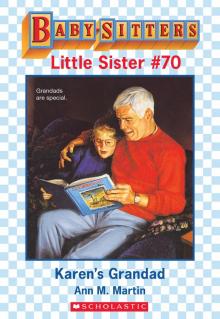 Karen's Grandad
Karen's Grandad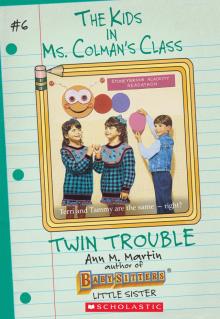 Twin Trouble
Twin Trouble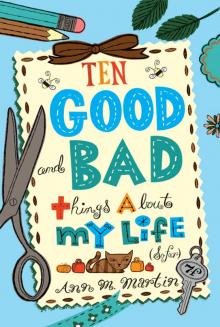 Ten Good and Bad Things About My Life (So Far)
Ten Good and Bad Things About My Life (So Far)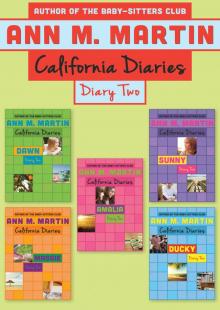 Diary Two
Diary Two Baby-Sitters Club 027
Baby-Sitters Club 027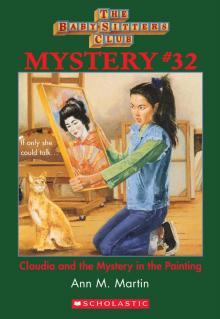 Claudia and the Mystery Painting
Claudia and the Mystery Painting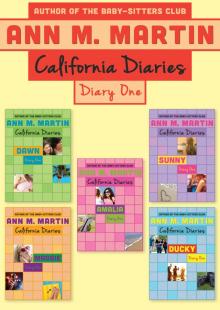 Diary One
Diary One Baby-Sitters Club 037
Baby-Sitters Club 037 Baby-Sitters Club 028
Baby-Sitters Club 028 Baby-Sitters Club 085
Baby-Sitters Club 085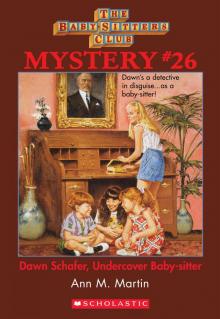 Dawn Schaffer Undercover Baby-Sitter
Dawn Schaffer Undercover Baby-Sitter Jessi's Babysitter
Jessi's Babysitter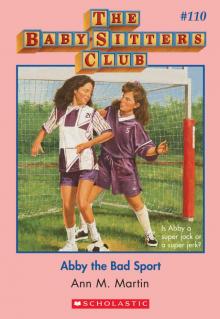 The Baby-Sitters Club #110: Abby the Bad Sport (Baby-Sitters Club, The)
The Baby-Sitters Club #110: Abby the Bad Sport (Baby-Sitters Club, The) Karen's Little Sister
Karen's Little Sister Baby-Sitters Club 058
Baby-Sitters Club 058 Claudia And The Genius On Elm St.
Claudia And The Genius On Elm St.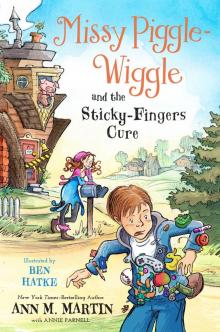 Missy Piggle-Wiggle and the Sticky-Fingers Cure
Missy Piggle-Wiggle and the Sticky-Fingers Cure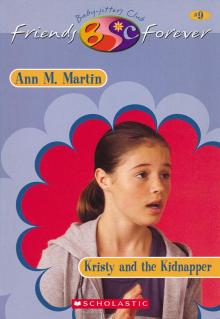 Kristy and Kidnapper
Kristy and Kidnapper Baby-Sitters Club 041
Baby-Sitters Club 041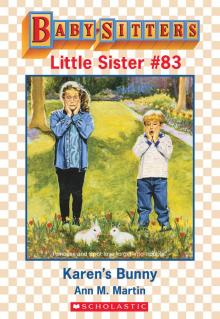 Karen's Bunny Trouble
Karen's Bunny Trouble Baby-Sitters Club 032
Baby-Sitters Club 032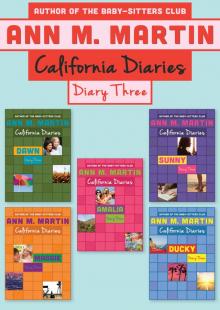 Diary Three
Diary Three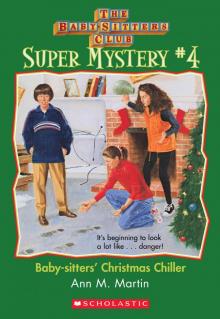 Christmas Chiller
Christmas Chiller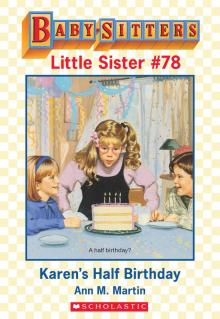 Karen's Half-Birthday
Karen's Half-Birthday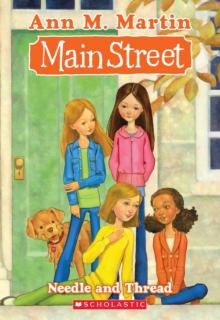 Needle and Thread
Needle and Thread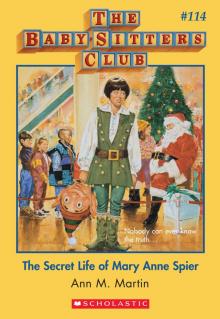 Secret Life of Mary Anne Spier
Secret Life of Mary Anne Spier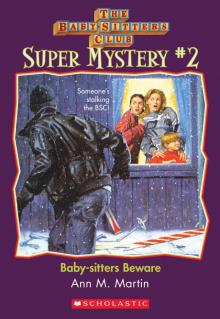 Baby-Sitters Beware
Baby-Sitters Beware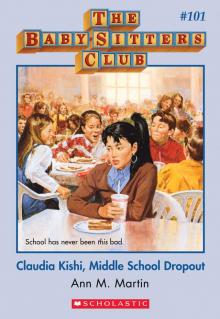 Claudia Kishi, Middle School Drop-Out
Claudia Kishi, Middle School Drop-Out Logan Likes Mary Anne !
Logan Likes Mary Anne ! Baby-Sitters Club 061
Baby-Sitters Club 061 Best Friends
Best Friends Baby-Sitters Club 031
Baby-Sitters Club 031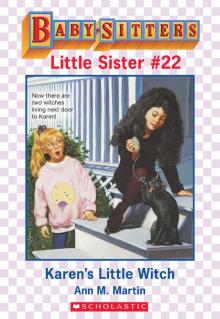 Karen's Little Witch
Karen's Little Witch Jessi Ramsey, Petsitter
Jessi Ramsey, Petsitter Baby-Sitters Club 123
Baby-Sitters Club 123 Baby-Sitters Club 059
Baby-Sitters Club 059 Baby-Sitters Club 033
Baby-Sitters Club 033 Baby-Sitters Club 060
Baby-Sitters Club 060 Baby-Sitters Club 094
Baby-Sitters Club 094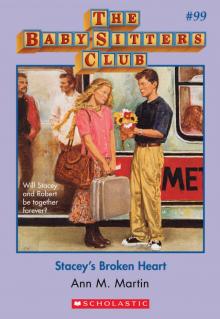 The Baby-Sitters Club #99: Stacey's Broken Heart
The Baby-Sitters Club #99: Stacey's Broken Heart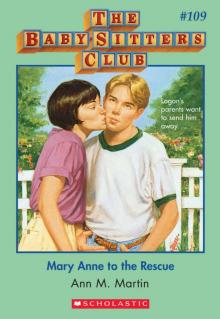 The Baby-Sitters Club #109: Mary Anne to the Rescue (Baby-Sitters Club, The)
The Baby-Sitters Club #109: Mary Anne to the Rescue (Baby-Sitters Club, The) Mystery At Claudia's House
Mystery At Claudia's House Claudia And The Sad Goodbye
Claudia And The Sad Goodbye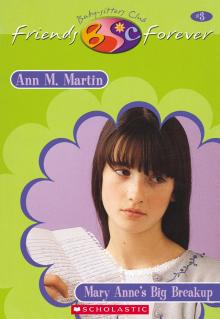 Mary Anne's Big Break-Up
Mary Anne's Big Break-Up Baby-Sitters Club 025
Baby-Sitters Club 025 Baby-Sitters Club 042
Baby-Sitters Club 042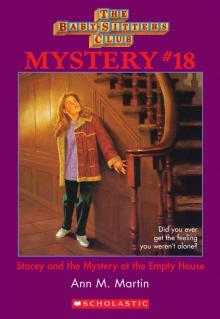 Stacey and the Mystery of the Empty House
Stacey and the Mystery of the Empty House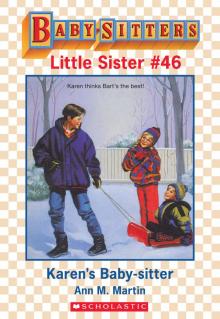 Karen's Baby-Sitter
Karen's Baby-Sitter Claudia's Friendship Feud
Claudia's Friendship Feud Baby-Sitters Club 090
Baby-Sitters Club 090 Baby-Sitters Club 021
Baby-Sitters Club 021 Baby-Sitters Club 056
Baby-Sitters Club 056 Baby-Sitters Club 040
Baby-Sitters Club 040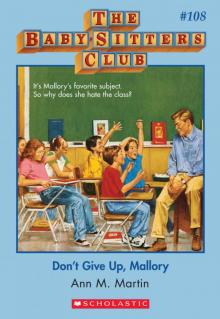 The Baby-Sitters Club #108: Don't Give Up, Mallory (Baby-Sitters Club, The)
The Baby-Sitters Club #108: Don't Give Up, Mallory (Baby-Sitters Club, The)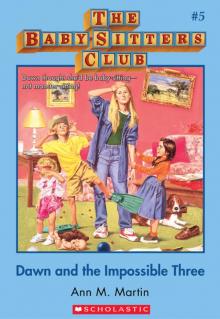 Dawn and the Impossible Three
Dawn and the Impossible Three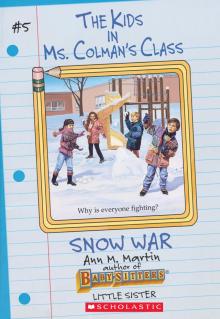 The Snow War
The Snow War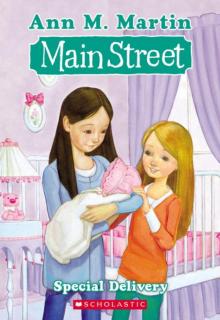 Special Delivery
Special Delivery Baby-Sitters Club 057
Baby-Sitters Club 057 Mary Anne And Too Many Babies
Mary Anne And Too Many Babies Baby-Sitters Club 030
Baby-Sitters Club 030